
- PhD Failure Rate – A Study of 26,076 PhD Candidates
- Doing a PhD
The PhD failure rate in the UK is 19.5%, with 16.2% of students leaving their PhD programme early, and 3.3% of students failing their viva. 80.5% of all students who enrol onto a PhD programme successfully complete it and are awarded a doctorate.

Introduction
One of the biggest concerns for doctoral students is the ongoing fear of failing their PhD.
After all those years of research, the long days in the lab and the endless nights in the library, it’s no surprise to find many agonising over the possibility of it all being for nothing. While this fear will always exist, it would help you to know how likely failure is, and what you can do to increase your chances of success.
Read on to learn how PhDs can be failed, what the true failure rates are based on an analysis of 26,067 PhD candidates from 14 UK universities, and what your options are if you’re unsuccessful in obtaining your PhD.
Ways You Can Fail A PhD
There are essentially two ways in which you can fail a PhD; non-completion or failing your viva (also known as your thesis defence ).
Non-completion
Non-completion is when a student leaves their PhD programme before having sat their viva examination. Since vivas take place at the end of the PhD journey, typically between the 3rd and 4th year for most full-time programmes, most failed PhDs fall within the ‘non-completion’ category because of the long duration it covers.
There are many reasons why a student may decide to leave a programme early, though these can usually be grouped into two categories:
- Motives – The individual may no longer believe undertaking a PhD is for them. This might be because it isn’t what they had imagined, or they’ve decided on an alternative path.
- Extenuating circumstances – The student may face unforeseen problems beyond their control, such as poor health, bereavement or family difficulties, preventing them from completing their research.
In both cases, a good supervisor will always try their best to help the student continue with their studies. In the former case, this may mean considering alternative research questions or, in the latter case, encouraging you to seek academic support from the university through one of their student care policies.
Besides the student deciding to end their programme early, the university can also make this decision. On these occasions, the student’s supervisor may not believe they’ve made enough progress for the time they’ve been on the project. If the problem can’t be corrected, the supervisor may ask the university to remove the student from the programme.
Failing The Viva
Assuming you make it to the end of your programme, there are still two ways you can be unsuccessful.
The first is an unsatisfactory thesis. For whatever reason, your thesis may be deemed not good enough, lacking originality, reliable data, conclusive findings, or be of poor overall quality. In such cases, your examiners may request an extensive rework of your thesis before agreeing to perform your viva examination. Although this will rarely be the case, it is possible that you may exceed the permissible length of programme registration and if you don’t have valid grounds for an extension, you may not have enough time to be able to sit your viva.
The more common scenario, while still being uncommon itself, is that you sit and fail your viva examination. The examiners may decide that your research project is severely flawed, to the point where it can’t possibly be remedied even with major revisions. This could happen for reasons such as basing your study on an incorrect fundamental assumption; this should not happen however if there is a proper supervisory support system in place.
PhD Failure Rate – UK & EU Statistics
According to 2010-11 data published by the Higher Education Funding Council for England (now replaced by UK Research and Innovation ), 72.9% of students enrolled in a PhD programme in the UK or EU complete their degree within seven years. Following this, 80.5% of PhD students complete their degree within 25 years.
This means that four out of every five students who register onto a PhD programme successfully complete their doctorate.
While a failure rate of one in five students may seem a little high, most of these are those who exit their programme early as opposed to those who fail at the viva stage.
Failing Doesn’t Happen Often
Although a PhD is an independent project, you will be appointed a supervisor to support you. Each university will have its own system for how your supervisor is to support you , but regardless of this, they will all require regular communication between the two of you. This could be in the form of annual reviews, quarterly interim reviews or regular meetings. The majority of students also have a secondary academic supervisor (and in some cases a thesis committee of supervisors); the role of these can vary from having a hands-on role in regular supervision, to being another useful person to bounce ideas off of.
These frequent check-ins are designed to help you stay on track with your project. For example, if any issues are identified, you and your supervisor can discuss how to rectify them in order to refocus your research. This reduces the likelihood of a problem going undetected for several years, only for it to be unearthed after it’s too late to address.
In addition, the thesis you submit to your examiners will likely be your third or fourth iteration, with your supervisor having critiqued each earlier version. As a result, your thesis will typically only be submitted to the examiners after your supervisor approves it; many UK universities require a formal, signed document to be submitted by the primary academic supervisor at the same time as the student submits the thesis, confirming that he or she has approved the submission.
Failed Viva – Outcomes of 26,076 Students
Despite what you may have heard, the failing PhD rate amongst students who sit their viva is low.
This, combined with ongoing guidance from your supervisor, is because vivas don’t have a strict pass/fail outcome. You can find a detailed breakdown of all viva outcomes in our viva guide, but to summarise – the most common outcome will be for you to revise your thesis in accordance with the comments from your examiners and resubmit it.
This means that as long as the review of your thesis and your viva examination uncovers no significant issues, you’re almost certain to be awarded a provisional pass on the basis you make the necessary corrections to your thesis.
To give you an indication of the viva failure rate, we’ve analysed the outcomes of 26,076 PhD candidates from 14 UK universities who sat a viva between 2006 and 2017.
The analysis shows that of the 26,076 students who sat their viva, 25,063 succeeded; this is just over 96% of the total students as shown in the chart below.
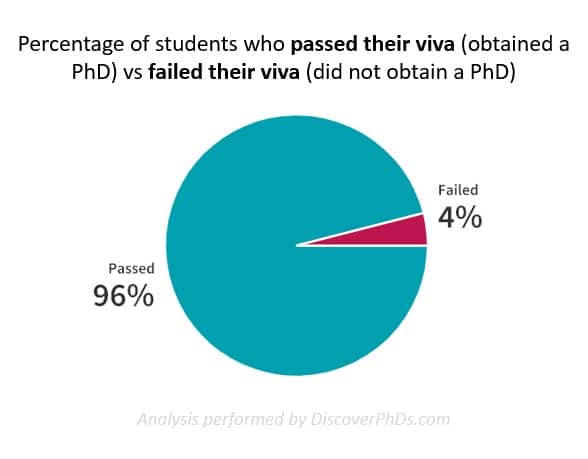
Students Who Passed
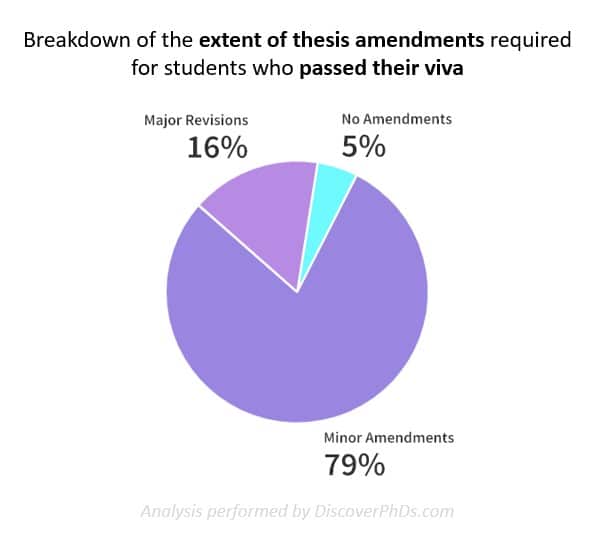
The analysis shows that of the 96% of students who passed, approximately 5% required no amendments, 79% required minor amendments and the remaining 16% required major revisions. This supports our earlier discussion on how the most common outcome of a viva is a ‘pass with minor amendments’.
Students Who Failed

Of the 4% of unsuccessful students, approximately 97% were awarded an MPhil (Master of Philosophy), and 3% weren’t awarded a degree.
Note : It should be noted that while the data provides the student’s overall outcome, i.e. whether they passed or failed, they didn’t all provide the students specific outcome, i.e. whether they had to make amendments, or with a failure, whether they were awarded an MPhil. Therefore, while the breakdowns represent the current known data, the exact breakdown may differ.
Summary of Findings
By using our data in combination with the earlier statistic provided by HEFCE, we can gain an overall picture of the PhD journey as summarised in the image below.

To summarise, based on the analysis of 26,076 PhD candidates at 14 universities between 2006 and 2017, the PhD pass rate in the UK is 80.5%. Of the 19.5% of students who fail, 3.3% is attributed to students failing their viva and the remaining 16.2% is attributed to students leaving their programme early.
The above statistics indicate that while 1 in every 5 students fail their PhD, the failure rate for the viva process itself is low. Specifically, only 4% of all students who sit their viva fail; in other words, 96% of the students pass it.
What Are Your Options After an Unsuccessful PhD?
Appeal your outcome.
If you believe you had a valid case, you can try to appeal against your outcome . The appeal process will be different for each university, so ensure you consult the guidelines published by your university before taking any action.
While making an appeal may be an option, it should only be considered if you genuinely believe you have a legitimate case. Most examiners have a lot of experience in assessing PhD candidates and follow strict guidelines when making their decisions. Therefore, your claim for appeal will need to be strong if it is to stand up in front of committee members in the adjudication process.
Downgrade to MPhil
If you are unsuccessful in being awarded a PhD, an MPhil may be awarded instead. For this to happen, your work would need to be considered worthy of an MPhil, as although it is a Master’s degree, it is still an advanced postgraduate research degree.
Unfortunately, there’s a lot of stigma around MPhil degrees, with many worrying that it will be seen as a sign of a failed PhD. While not as advanced as a PhD, an MPhil is still an advanced research degree, and being awarded one shows that you’ve successfully carried out an independent research project which is an undertaking to be admired.
Finding a PhD has never been this easy – search for a PhD by keyword, location or academic area of interest.
Additional Resources
Hopefully now knowing the overall picture your mind will feel slightly more at ease. Regardless, there are several good practices you can adopt to ensure you’re always in the best possible position. The key of these includes developing a good working relationship with your supervisor, working to a project schedule, having your thesis checked by several other academics aside from your supervisor, and thoroughly preparing for your viva examination.
We’ve developed a number of resources which should help you in the above:
- What to Expect from Your Supervisor – Find out what to look for in a Supervisor, how they will typically support you, and how often you should meet with them.
- How to Write a Research Proposal – Find an outline of how you can go about putting a project plan together.
- What is a PhD Viva? – Learn exactly what a viva is, their purpose and what you can expect on the day. We’ve also provided a full breakdown of all the possible outcomes of a viva and tips to help you prepare for your own.
Data for Statistics
- Cardiff University – 2006/07 to 2016/17
- Imperial College London – 2006/07 to 2016/17
- London School of Economics (LSE) – 2006/07 to 2015/16
- Queen Mary University of London – 2009/10 to 2015/16
- University College London (UCL) – 2006/07 to 2016/17
- University of Aberdeen – 2006/07 to 2016/17
- University of Birmingham – 2006/07 to 2015/16
- University of Bristol – 2006/07 to 2016/17
- University of Edinburgh – 2006/07 to 2016/17
- University of Nottingham – 2006/07 to 2015/16
- University of Oxford – 2007/08 to 2016/17
- University of York – 2009/10 to 2016/17
- University of Manchester – 2008/09 to 2017/18
- University of Sheffield – 2006/07 to 2016/17
Note : The data used for this analysis was obtained from the above universities under the Freedom of Information Act. As per the Act, the information was provided in such a way that no specific individual can be identified from the data.
Browse PhDs Now
Join thousands of students.
Join thousands of other students and stay up to date with the latest PhD programmes, funding opportunities and advice.
- Teaching, learning and quality
Higher education in facts and figures: 2021
Last updated on Wednesday 14 Jun 2023 at 2:52pm
On this page
About this data.
- Back to top
An overview of the data on students, staff and university finances from our member institutions.
Highlights
Record proportions of the most disadvantaged students began a full-time undergraduate course in the UK in 2020, across all four nations of the UK.
In 2020, median graduate salaries were £10,000 higher in England than non-graduate salaries.
In 2019−20, 15.8% of undergraduate students and 40.5% of postgraduate students at UUK member institutions were from outside the UK.
In 2019−20, nearly half of total expenditure was spent directly on teaching and research activities.

What data have we used?
Most data we’ve used refers to just our member institutions. This covers 140 universities and higher education providers in the UK.
The data we have used for each chart is clearly labelled and mostly comes from the Higher Education Statistics Agency (HESA) records, which covers a wider set of providers. The below charts show the proportion of student, staff and finance data within each of the public HESA records that is represented by Universities UK members.

Promoted content
Stay up to date with our work.
Our monthly updates are a great way for you to stay up to date with our work, events, and higher education news.
In 2019−20, there were 2,413,155 students at UUK member institutions; an increase of 3.1% compared to 2018−19. Of these students:
- 79.6% studied full time
- 74.5% were undergraduates
- 5.8% were from EU countries
- 16.3% were from other non-EU countries
- 56.9% were females
- 59.9% were mature students (aged 21 and over)
Students by mode of study and country of institution, 2019–20
The number of students studying full time has increased by 3.1% since 2018–19. Part-time numbers have decreased slightly (down 0.2% on 2018–19). In 2019−20, part-time students accounted for 36.9% of postgraduate students and 14.7% of undergraduate students.
Students by level and mode of study, 2019–20
In 2019–20, four fifths of students were studying full-time. 69.2% of students were studying for a first degree either full or part time, and a quarter (25.5%) were postgraduates. 'Other undergraduates' (which includes those studying for foundation degrees, diplomas in higher education, or Higher National Diplomas among others) were the most likely to be studying part time, followed by postgraduate taught students.
Applicants, acceptances and UK 18-year-old entry rates, 2011 to 2020
For the 2020 cycle, the total number of people applying for UK full-time undergraduate higher education courses increased by 3.2% on 2019, while total acceptances increased by 5.4%. The UK 18-year-old entry rate was also at record levels, with 37.0% of this group starting a full-time undergraduate course.
Entry rates of the most disadvantaged 18-year-olds by domicile, 2011 to 2021
Record proportions of the most disadvantaged students began a full-time undergraduate course in the UK in 2020 across all four nations of the UK. The charts below show the proportion of 18-year-olds from the areas considered to be in the top fifth most disadvantaged areas who began a course.
Students by age and ethnicity, 2019–20
In 2019−20, mature students (aged 21 and over) accounted for 57.5% of the student population at UUK member institutions. This includes 44.3% of students studying for their first undergraduate degree. Black, Asian and minority ethnic (BAME) students accounted for 25.1% of students living permanently in the UK.
Students by sex, subject area and level of study, 2019–20
In 2019−20, undergraduate student numbers were highest in the subjects of business, subjects allied to medicine and social sciences. Postgraduate numbers were highest for business, subjects allied to medicine and education. Psychology had the highest proportion of female students at 81.1% with the lowest found in computing, and engineering and technology at 19.8% each.
Students by domicile and level of study, 2019–20
In 2019−20, 5.5% of undergraduates were from EU countries, while 10.3% were from outside the EU. Percentages for postgraduates were 6.8% and 33.7% respectively.

In 2019-20, UUK members awarded 761,215 qualifications.
- 61% were undergraduate qualifications and 39% were postgraduate
- 80% of graduates were in employment or unpaid work 15 months after graduation
- 19% of graduates were in further study
- Median salaries for graduates were £9,500 higher than non-graduates
- 5.3% of non-graduates were unemployed compared to 3.7% of graduates
Qualifications awarded by level and mode of study, 2019–20
In 2019−20, more than half (53.6%) of qualifications awarded by UUK member institutions were first degrees. 85.8% of qualifications awarded were for full-time study.
Graduate outcomes by activity, 2018–19
In 2019−20, 80% of graduates who responded to HESA's Graduate Outcomes survey were in employment or unpaid work. 19% of survey respondents were in further study, including those who were also in employment.
Unemployment rates and median salaries in England, 2020
In 2020, median salaries for England-domiciled graduates were £9,500 higher than median non-graduate salaries. The graduate unemployment rate was 3.7%, compared to 5.3% for non-graduates, while the high-skill employment rate was 53.9 percentage points higher for postgraduates than non-graduates, and 41.5 percentage points higher for graduates than non-graduates.

In 2019−20, there were 409,055 staff at UUK member institutions, of these:
- 53.0% were academic staff
- 12.7% were from EU countries
- 9.5% were from non-EU countries
- 54.2% were female
- 30.7% were aged under 35 years old
- 14.4% were Black, Asian and minority ethnic staff.
Staff by nationality and employment function, 2019–20
In 2019−20, over a fifth (22.2%) of staff at UUK member institutions had a non-UK nationality. Half (48.9%) of academic staff with a 'research only' function had a non-UK nationality.
Academic staff by nationality and cost centre, 2019−20
In 2019−20, non-UK staff accounted for nearly half (47.2%) of academic staff in engineering and technology compared to 13.3% in education.
Academic staff by sex, mode of employment and age, 2019–20
In 2019−20, 46.6% of academic staff at UUK member institutions were female, while 34.0% of staff were working part-time. 29.0% were 35 or under.
Professors by sex and ethnicity, 2015–16 to 2019–20
Although the number of Black, Asian and minority ethnic (BAME), professors has increased by nearly a third (32.2%) since 2015−16, they only accounted for 10.0% of professors in 2019−20. Over half (58.6%) were white males.

In 2019–20, the total reported income of UUK member institutions was £39.8 billion. Just over half of this income (£20.7 billion) was related to teaching, 15% was related to research (£6.1 billion), and 11% was related to knowledge exchange activity (£4.5 billion).
In 2019–20, our members' total expenditure was £36.4 billion. Nearly half (£17.5 billion) was spent on direct teaching and research activity, and over a tenth (£3.8 billion) was spent on libraries, IT and museums.
Income and size of higher education institutions, 2018–19 to 2019–20
In 2019−20, three quarters of UUK members had an annual income of £100 million or more, with a similar proportion having at least 10,000 students.
Income by source, 2019–20
In 2019−20, the total reported income of UK higher education institutions was £39.8 billion. Around half (£20.7 billion) of this income was sourced through tuition fees.
Teaching, research and knowledge exchange income by source, 2019–20
In 2019−20 around a third (32.3%) of teaching income was from international students from outside the EU. A third of research income came from research councils (33.6%), and nearly a quarter (23.3%) came from outside of the UK. In 2019−20, over a third of knowledge exchange income came from collaborative research involving public funding. This includes collaboration with at least one non-academic partner, which can include businesses, the third sector, and the public. The estimated current turnover of spin-off or start-up firms based on providers' intellectual property, or started by staff, students or graduates increased significantly in 2019−20. Businesses associated with UUK members had an estimated turnover of £7.9 billion with the majority coming from staff start-ups (£2.8 billion) and student start-ups (£2.6bn).
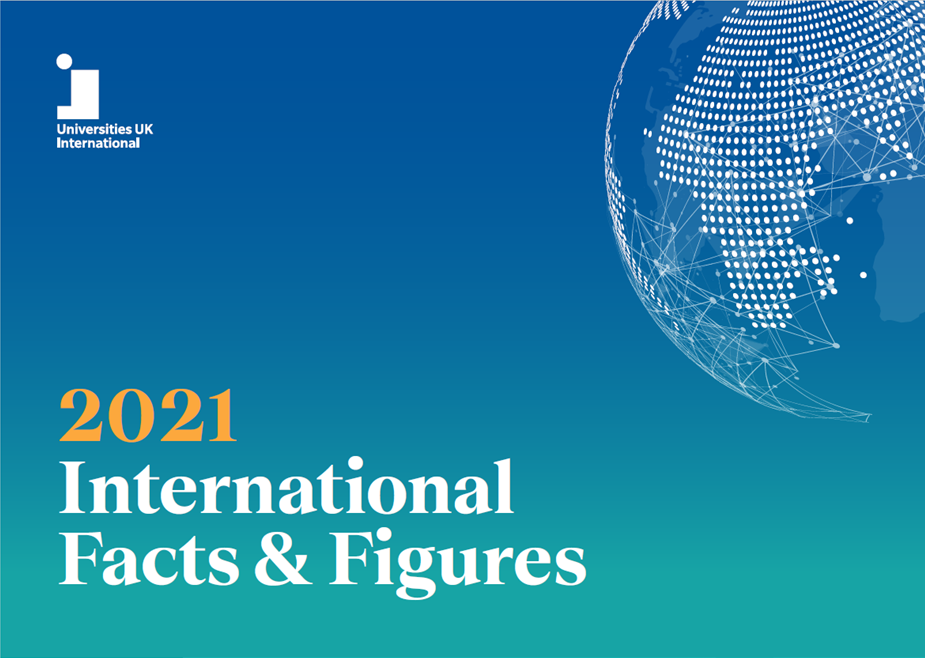
International Facts and Figures 2021
International Facts and Figures is our annual snapshot of the international dimensions of UK higher education.
Operating expenditure of UK higher education institutions, 2019–20
In 2019–20, the total reported operating expenditure of UUK member institutions was £36 billion. Nearly half of this was spent directly on teaching and research activities. Other areas of spending include those that support teaching and learning, such as libraries and IT, maintaining campuses, providing financial support to students and student facilities.
Academic employment function
A HESA field relating to staff with academic contracts. Categories are divided according to whether the contract is ‘teaching only’, ‘research only’ (no more than six hours of teaching per week), ‘teaching and research’, and neither teaching nor research. For more information visit HESA's website .
Cost centre
Cost centre is a financial concept which groups staff members to categories of spending. They enable analysis between the student, staff and finance streams. The cost centre groups are separate to the JACS/HESA codes due to the groupings and are therefore non-comparable. The reason they can't be compared and the breadth of the elements in this field is to replicate the way in which resources (including staff) can be split over multiple courses and the differences in the way individual higher education providers allocate them. For more information visit HESA's website .
A student’s permanent country of residence. This differs from nationality (see below).
The number of university entrants divided by the estimated base population.
The Higher Education Statistics Agency (HESA) is the designated data body for English higher education.
High-skill employment
Occupations at this level are generally termed ‘professional’ or ‘managerial’ positions and are found in corporate enterprises or governments. Occupations include senior government officials, financial managers, scientists, engineers, medical doctors, teachers and accountants.
Knowledge exchange activities
Activities that bring together academic staff, users of research and wider groups and communities to exchange ideas, evidence and expertise. Information on knowledge exchange activities is collected by HESA through their Higher Education Business and Community Interaction (HEBCI) survey. For more information visit HESA's website .
Level of study
Whether a student studies at undergraduate or postgraduate level. With these groupings, there are other levels such as ‘first degree’, ‘other undergraduate’, ‘postgraduate (research)’ and ‘postgraduate (taught)’. For more information visit HESA's website .
Mode of study
Whether a student studies full or part time.
Nationality
A HESA field that records the legal nationality of staff. For more information visit HESA's website .
Participation of Local Areas (POLAR) is a widening participation measure which classifies local areas or ‘wards’ into five groups, based on the proportion of 18-year-olds who enter higher education aged 18 or 19 years old. These groups range from quintile 1 areas, with the lowest young participation (most disadvantaged), up to quintile 5 areas with the highest rates (most advantaged).
Professorial staff
HESA codes each staff contract. Professor level is defined as ‘senior academic appointments which may carry the title of professor, but which do not have departmental line management responsibilities’. Other senior contracts include leadership and management responsibilities. These contracts may also be held by people who hold the title of professor. It is likely that the methodology undercounts the number of professors because many will fall into more senior levels, eg heads of department.
The Scottish Index of Multiple Deprivation for 2016 is a widening participation measure that identifies small areas of multiple deprivation across Scotland and classifies them into five groups. These groups range from quintile 1 – areas identified as the most disadvantaged, to quintile 5 – areas identified as the most advantaged.
HESA Standard Rounding Methodology
We have applied HESA’s Standard Rounding Methodology to all analysis of HESA data:
- Counts of people are rounded to the nearest multiple of five
- Percentages are not published if they are fractions of a small group of people (fewer than 22.5)
- We have applied the methodology after making calculations, which sometimes means numbers in tables may not sum up to indicated totals
For more information, visit HESA's website .
HESA sources in this report are copyright Higher Education Statistics Agency Limited.
Neither the Higher Education Statistics Agency Limited nor HESA Services Limited can accept responsibility for any inferences or conclusions derived by third parties from data or other information obtained from Heidi Plus.
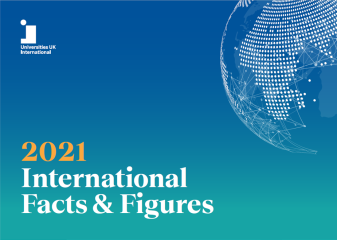
Higher education in numbers
Key facts and figures about UK higher education.
- Share on twitter
- Share on facebook
PhD completion rates, 2013
The proportion of phd students in england expected to obtain degrees has risen slightly, but at some institutions around a fifth may never qualify..
- Share on linkedin
- Share on mail

According to a report published on July 26 by England’s funding council, 72.9 per cent of the 11,625 students from the UK or the EU who began full-time doctorates in 2010-11 will obtain a degree within seven years. This compares with 70.1 per cent who started in 2009-10 and 70.5 per cent in 2008-09.
A further 1.7 per cent of students who began in 2010-11 will qualify with another postgraduate research qualification, according to the report, entitled “Rates of qualification from postgraduate research degrees: Projected study outcomes of full-time students starting postgraduate research degrees in 2010-11”.
Meanwhile 80.5 per cent will complete their PhD within 25 years: the point at which anyone who is going to earn a doctorate is assumed to have done so. The equivalent figure for the 2009-10 cohort was 78.2 per cent.
The predictions are based on the proportion of students who change status in institutions’ annual submissions to the Higher Education Statistics Agency.
This is compared with a benchmark figure, calculated using a sector average adjusted for factors such as variations in each institution’s subject spread and their students’ domicile, highest entry qualification and funding source.
The figures also show that nine institutions are likely to see the qualification rates for their 2010-11 intakes fall significantly below their expected benchmark qualification levels, compared with 10 in the 2009-10 intake.
The only Russell Group member among them is the University of Warwick , whose predicted 25-year pass rate of 68.9 per cent is 13.4 percentage points below its benchmark – although the universities of Exeter and Newcastle also fall short of their benchmark for passes within seven years.
The lowest predicted pass rate is recorded by London Metropolitan University , only 15.2 per cent of whose 2010-11 cohort is expected to qualify within 25 years, compared with a benchmark of 77.5 per cent. At the University of Bolton , 19.8 per cent are expected to qualify within 25 years, compared with a benchmark of 79.5 per cent.
The number of universities expected to significantly exceed their benchmarks remains five: Queen Mary, University of London, King’s College London and the universities of Oxford, Liverpool and Bradford.
Steven Hill, head of research policy at the Higher Education Funding Council for England, welcomed the improvement in qualification rates.
“Hefce will seek to continue to enhance understanding of qualification rates from different forms of postgraduate study so that we can most effectively support continuous improvement as well as excellence in the national research base,” he said.
Related files
Projected outcomes of full-time students starting postgraduate research degrees in 2010-11.
Register to continue
Why register?
- Registration is free and only takes a moment
- Once registered, you can read 3 articles a month
- Sign up for our newsletter
Or subscribe for unlimited access to:
- Unlimited access to news, views, insights & reviews
- Digital editions
- Digital access to THE’s university and college rankings analysis
Already registered or a current subscriber? Login
You might also like

NIH raises postdoctoral salaries, but below target
Top US funding agency manages record increase in key programme for younger scientists, and sees gains in overall equity, while absorbing net cut in its annual budget

How to win the citation game without becoming a cynic
Boosting your publication metrics need not come at the expense of your integrity if you bear in mind these 10 tips, says Adrian Furnham

Black vice-chancellor eyes new generation of minority researchers
David Mba creates fully funded PhD studentships after taking reins at Birmingham City University

Renaming postdocs and PhD students would boost respect, pay, progression
What other industry would deem those with so much prior training to still be mere trainees? Let’s call them what they are – researchers, says Michele Nardin
Featured jobs
Skip to content. | Skip to navigation
Personal tools
- Log in/Register Register

https://www.vitae.ac.uk/doing-research/are-you-thinking-of-doing-a-phd/what-is-it-like-doing-doctoral-research-in-the-uk/the-uk-doctoral-research-experience
This page has been reproduced from the Vitae website (www.vitae.ac.uk). Vitae is dedicated to realising the potential of researchers through transforming their professional and career development.
- Vitae members' area
The UK doctoral research experience
Although the UK has about 4% of the world’s researchers, they are responsible for nearly 12% of citations and 16% of the most highly cited research (International Comparative Performance of the UK Research Base report, 2013) . So the UK punches above its weight in terms of research quality and output. But what makes the UK research experience unique?
The UK has a long and rich history in education and of producing rigorous research. The pedagogy and educational culture in UK higher education encourages free and independent thinking, challenging of existing theories and testing new ones. There is also some attraction in the relatively shorter length of UK doctoral programmes than in many other countries, particularly when compared to US doctoral degrees.
The completion rate is also high in the UK, where institutions have limited registration periods (unlike in the US where there is no limit on registration time for a PhD). Around 75% of full-time doctorates are submitted within seven years in the UK, which is rising, and about 80% of those funded by the UK Research Councils submit within four years. On the other hand, it is exceptional in the US to complete in four years or less (11% of full-time complete in four years, and over one in four formally give up within this time).
These positive aspects result in UK universities being able to attract large numbers of doctoral researchers from around the world, to add to their already highly international taught masters student cohorts. This means that the UK’s postgraduate population is possibly uniquely cosmopolitan, which can have real benefits in developing a global outlook.
The UK’s world-class research base has been achieved through continued development of the people within it. There is a strong dedication from government, universities and research institutes to skills development for the UK research workforce with most universities provide a programme of development for researchers that is informed by the Vitae Researcher Development Framework . The UK’s support for researchers' professional development is world-leading.
Bookmark & Share

Study at Cambridge
About the university, research at cambridge.
- Undergraduate courses
- Events and open days
- Fees and finance
- Postgraduate courses
- How to apply
- Postgraduate events
- Fees and funding
- International students
- Continuing education
- Executive and professional education
- Courses in education
- How the University and Colleges work
- Term dates and calendars
- Visiting the University
- Annual reports
- Equality and diversity
- A global university
- Public engagement
- Give to Cambridge
- For Cambridge students
- For our researchers
- Business and enterprise
- Colleges & departments
- Email & phone search
- Museums & collections
- Course Directory
- Qualification types
Doctor of Philosophy (PhD)
Postgraduate Study
- Why Cambridge overview
- Chat with our students
- Cambridge explained overview
- The supervision system
- Student life overview
- In and around Cambridge
- Leisure activities
- Student unions
- Music awards
- Student support overview
- Mental health and wellbeing
- Disabled students
- Accommodation
- Language tuition
- Skills training
- Support for refugees
- Courses overview
- Department directory
- Funded studentships
- Part-time study
- Research degrees
- Visiting students
- Finance overview
- Fees overview
- What is my fee status?
- Part-time fees
- Application fee
- Living costs
- Funding overview
- Funding search
- How to apply for funding
- University funding overview
- Research Councils (UKRI)
- External funding and loans overview
- Funding searches
- External scholarships
- Charities and the voluntary sector
- Funding for disabled students
- Widening participation in funding
- Colleges overview
- What is a College?
- Choosing a College
- Terms of Residence
- Applying overview
- Before you apply
- Entry requirements
- Application deadlines
- How do I apply? overview
- Application fee overview
- Application fee waiver
- Life Science courses
- Terms and conditions
- Continuing students
- Disabled applicants
- Supporting documents overview
- Academic documents
- Finance documents
- Evidence of competence in English
- Terms and Conditions
- Applicant portal and self-service
- After you apply overview
- Confirmation of admission
- Student registry
- Previous criminal convictions
- Deferring an application
- Updating your personal details
- Appeals and Complaints
- Widening participation
- Postgraduate admissions fraud
- International overview
- Immigration overview
- ATAS overview
- Applying for an ATAS certificate
- Current Cambridge students
- International qualifications
- Competence in English overview
- What tests are accepted?
- International events
- International student views overview
- Akhila’s story
- Alex’s story
- Huijie’s story
- Kelsey’s story
- Nilesh’s story
- Get in touch!
- Events overview
- Upcoming events
- Postgraduate Open Days overview
- Discover Cambridge: Master’s and PhD Study webinars
- Virtual tour
- Research Internships
- How we use participant data
- Postgraduate Newsletter
The degree of Doctor of Philosophy (PhD) is the University's principal research degree for graduate students and is available in all faculties and departments.
A Cambridge PhD is intellectually demanding and you will need to have a high level of attainment and motivation to pursue this programme of advanced study and research.
In most faculties, a candidate is expected to have completed one year of postgraduate study, normally on a research preparation master's course, prior to starting a PhD.
Completion normally requires three or four years of full-time study, or at least five years of part-time study, including a probationary period.
Terms of research are normally consecutive and, for full-time students, require residency in Cambridge. Not all departments offer part-time research degrees.
Various routes to the PhD are possible and, if you are made an offer of admission, it will be made clear whether you are required to study for a master's degree or certificate in the first instance, or will be admitted directly to the probationary year for the PhD. You are registered for the PhD only after a satisfactory progress assessment at the end of the probationary year (five terms for part-time degrees). The assessment is designed also to focus your mind on the stages necessary for the completion of your research within the normal time limit and to address any structural problems that have arisen during the first year. Students must pass the first year assessment in order to continue their PhD study.
During your PhD, your effort will be focused on writing a dissertation. The word count of the dissertation is dependent on the department and the Student Registry or Educational Student Policy will be able to tell you the maximum word limit. This must represent a significant contribution to learning, for example through the discovery of new knowledge, the connection of previously unrelated facts, the development of a new theory, or the revision of older views, and must take account of previously published work on the subject. Some Cambridge dissertations go on to form the basis of significant publications.
Although you will spend long hours working independently, your department and College will both support you throughout your PhD. You are also able to attend regular seminars in your subject area and could be involved in teaching, perhaps giving seminars or supervising, or in the social life of your department and College.
PhD course search
Go to the Course Directory and filter courses using the relevant checkboxes.
Term Information
Explanation of terms, postgraduate admissions office.
- Admissions Statistics
- Start an Application
- Applicant Self-Service
At a glance
- Bringing a family
- Current Postgraduates
- Cambridge Students' Union (SU)
University Policy and Guidelines
Privacy Policy
Information compliance
Equality and Diversity
Terms of Study
About this site
About our website
Privacy policy
© 2024 University of Cambridge
- Contact the University
- Accessibility
- Freedom of information
- Privacy policy and cookies
- Statement on Modern Slavery
- University A-Z
- Undergraduate
- Postgraduate
- Research news
- About research at Cambridge
- Spotlight on...

PhD completion: an evidence-based guide for students, supervisors and universities
Senior Lecturer in Management, Fellow of the APS College of Organisational Psychologists, Swinburne University of Technology
Disclosure statement
Timothy Colin Bednall does not work for, consult, own shares in or receive funding from any company or organisation that would benefit from this article, and has disclosed no relevant affiliations beyond their academic appointment.
Swinburne University of Technology provides funding as a member of The Conversation AU.
View all partners
Many students enrol in a Master or PhD postgraduate research degree, but few complete them. From 2010-2016 , 437,030 domestic and international students enrolled in postgraduate research programs in Australian public universities. Only 65,101 completed within the same six year period.
This discrepancy does not necessarily mean postgraduate research students “failed” their degree. Common reasons not completing a degree include changes of career goals, work-family conflicts, poor health or financial strain. Alternatively, some students remain enrolled in their degree for long periods without making significant progress.
Even so, the discrepancy is large enough for universities to be concerned. Nobody wants a student to suffer through years of hard work and frustration without achieving their goal.
What does research say about completion rates?
Research has identified several factors that make students more likely to persist with their degrees. These factors are related to the students themselves, their supervisor, and the university environment.

Psychological studies of postgraduate students find the more successful ones tend to perceive themselves as competent and be intrinsically motivated . These are students who enjoy their topic area, perceive their postgraduate studies as a valuable learning experience, and who strongly identify with being a career researcher. Students who are motivated by external factors (such as pursuing a prestigious academic role) are more likely to say they want to quit.
Scholarship holders are more likely to complete their degrees. This is likely because they are academically stronger than non-scholarship holders and are less vulnerable to financial strain. Students can support themselves financially through teaching, research assistant roles or other work, but this must be balanced carefully. Part-time students are less likely to complete their degrees.
Students’ field of study also affects completion rates. A higher proportion of students in sciences tend to complete their degrees than those in arts and humanities. This is likely because students working in the sciences are more often involved in laboratory-based work in teams, where there is greater social support and knowledge exchange. People studying humanities more often work on their research alone.
A positive student-supervisor working relationship is critical. A good supervisor should be an expert in the student’s subject of choice and a supportive mentor. They should help the student navigate through the frustrations and uncertainties of writing a thesis, and help students adjust to the world of academia.
Students are also more likely to finish their research degrees if they have strong connections with their peers . Such connections help students develop their professional identity as researchers, as well as providing opportunities for social support and informal learning .

The quality of associated coursework is also important. Ideally, postgraduate programs should provide students with a sound foundation of research skills and content knowledge, and facilitate ongoing communication with their faculty.
Involvement in formal and informal professional activities is also important. Students who complete tend to participate in departmental events, such as research seminars and professional development workshops. They also tend to participate in academic conferences. These events allow students to learn and expand their networks.
What students and their supervisors should do
First, given the importance of the student-supervisor relationship, universities can provide advice to students about locating and approaching a suitable supervisor. Specifically, students should consider the research area they wish to work in and locate a supervisor with relevant expertise. They should approach supervisors with an openness to negotiating a research topic.
Read more: Ten types of PhD supervisor relationships – which is yours?
Both students and supervisors should be upfront about their expectations about how the supervision will work. An excellent starting point for discussion is the Expectations in Supervision questionnaire. Students and supervisors sometimes have mismatched expectations about how often they should meet, the amount of feedback the supervisor should provide on drafts, and how much counselling and emotional support the supervisor should provide.
Supervisors have an important role in providing a realistic preview of academic life. One useful exercise is to review an academic competency model, such as the Vitae Researcher Development Framework , to discuss which skills academics need. In addition to knowledge of their topic area and research methods, academics increasingly need to be good at managing complex projects, working in multidisciplinary teams, and engaging with industry and media.
This discussion should enable supervisors and students to plan how students will develop their capabilities. Alternatively, it could prompt some students to opt out of a research degree if they think an academic role is not compatible with their goals.
What universities should do
As well as providing research training, universities can also increase the capabilities of students by helping them understand self-handicapping patterns. These include busyness, procrastination and disorganisation.
Students can be guided to replace these with more helpful actions such as scheduling dedicated writing time, reframing difficult tasks as learning opportunities, and developing a work routine. This could be done as part of a workshop or supervisory relationship.
Universities should also encourage greater connectedness between research students to build social support. This could be accomplished through team-based activities or face-to-face events.
For instance, some universities offer Three Minute Thesis , a research communication competition where students present their work in under 180 seconds.
Some universities organise Shut Up and Write sessions, which turns writing into a social experience and limits distractions. These activities can be complemented by encouraging students to become involved in supportive online communities and blogging .
Read more: The rise of writing events gives PhD students the support often lacking in universities
Finally, universities should be dedicated to helping academics develop as supervisors through ongoing training and coaching. Departments could consider tracking the progression of students and ensuring supervisors have the time and skills to take on new students.
Completing a dissertation can be richly rewarding, but it’s the endpoint of a process that’s often long, frustrating and uncertain. Helping students achieve their research aspirations makes academic life a better experience for all involved.
- Postgraduate degrees
- PhD supervisors
- PhD students

Events and Communications Coordinator

Assistant Editor - 1 year cadetship

Executive Dean, Faculty of Health


Lecturer/Senior Lecturer, Earth System Science (School of Science)

Sydney Horizon Educators (Identified)
- Postgraduate
- PhD and Professional Doctorates
- Fees and funding
Fees and funding for research students
Find out how much a PhD or Professional Doctorate will cost and the funding options available, including PhD studentships, stipends, loans and doctoral awards.
Once you’ve decided to study a research degree, the next step is figuring out how you're going to fund it. There are many different types of funding, including studentships, external grants, and loans. Explore this page to see what’s available and how much a research degree will cost.
How much does a PhD or Professional Doctorate cost?
Our tuition fees are set and reviewed on an annual basis and the amount you pay will depend on the length of your course and mode of study. For some Science and Technology projects, an annual bench fee may also be payable.
Postgraduate Research fees for 2023/24 entry
Postgraduate research fees for 2024/25 entry, phd funding.
There are many different ways to fund a PhD, including university studentships, funding from research councils, charities or businesses, and doctoral loans. PhD funding falls into three main categories:
- Fully-funded – your PhD tuition fees are covered in full along with an amount for living costs and other expenses (usually called a stipend).
- Partially-funded – part of your fees or living costs are covered, but not both. You will usually need to top up this funding with your own money or other grants.
- Self-funded – you are financing your own PhD fees and living costs through a combination of savings or earnings and loans.
Search our current projects .
ESRC studentships
The Midlands Graduate School (ESRC accredited) is looking to recruit top quality PhD students to commence study in October 2024 across a range of subjects, offering studentships – covering a maintenance stipend and payment of tuition fees at the home fee rate.

NTU fully-funded PhD studentships
Every year we provide fully-funded PhD studentships with opportunities across all our academic disciplines. These cover the full cost of tuition plus a stipend for living expenses for both UK and International students. Applications usually open in October.
Sign up for emails to be notified of the next release and to keep up to date with research funding.
What is a PhD stipend?
Some funded projects may eligible for a stipend – a grant to help cover your living expenses that you don't have to pay back. Find out the current minimum stipend rates set by UK Research and Innovation (UKRI).
Funding for international researchers
Many of our funded PhD projects are open to international students. Check the specific project details to see who is eligible.
FindaPhD also provides a guide to funding for international students looking to study a PhD in the UK.
Other funded opportunities at NTU
We’re pleased to participate in funded projects that improve access to research and benefit local communities.
Midlands4Cities
Funding and supporting outstanding research in Arts and Humanities across the Midlands.
Co(l)laboratory
A Universities for Nottingham project providing funding for locally-relevant, challenge-based research.
Equality and Doctoral Education through Partnership and Innovation (EDEPI)
A funded programme for NHS workers, created to tackle barriers to doctoral education for racially minoritised groups.
ESRC Studentships
Funding and further support for doctoral candidates in a range of subjects and pathways.
Doctoral loans
Student Finance England and Student Finance Wales provide a non-means-tested Doctoral loan of up to £28,673 to help with course fees and living costs for a postgraduate research course, such as a PhD or Professional Doctorate.
These are available on full-time, part-time and distance learning courses if you are living in the UK and you’ll only start to repay when your income is over £21,000 a year.
Disabled Students’ Allowances (DSA)
Disabled Students’ Allowance (DSA) helps to cover the extra costs you might incur because of a disability, including a long-term health condition, mental health condition, physical disability, or specific learning difficulty such as dyslexia or dyspraxia.
Learn more about DSA
Alumni discount
We offer an exclusive 20% discount to NTU alumni who enrol on an eligible postgraduate course.
External funding
A variety of research councils, governmental agencies and charities can provide funding for your research degree. Take a look at some of the opportunities available below.
Animal, Rural and Environmental Sciences
- Natural Environment Research Council (NERC) - the UK's main agency for funding and managing research, training and knowledge transfer in the environmental sciences.
Art and Humanities
- Arts and Humanities Research Council (AHRC) - small, large, and project-based grants for students in humanities and social sciences.
Science and Technology
- Biotechnology and Biological Sciences Research Council (BBSRC) - funding provider for research into biological systems
- Engineering and Physical Sciences Research Council (EPSRC) - funding for Information Systems and Mathematics research.
Social Sciences
- Arts and Humanities Research Council (AHRC) - small, large, and project-based grants for students in humanities and social sciences
- Economic and Social Research Council (ESRC) - the UK's largest organisation for funding research on economic and social issues
- Ford Foundation - provides grants to support research into social change and development
- Joseph Rowntree Foundation - endowed charity that funds a large, UK-wide research and development programme focussing on social policy issues
- National Institute for Health Research (NIHR) - supporting researchers in health and social care
- Nuffield Foundation - fund research and innovation in education and social policy
- Social Science Research Council (SSRC) - an independent non-profit organization devoted to the advancement of social science research and scholarship
- Wellcome Trust - grants for human health-related research.
Situational
- Commonwealth Scholarships - offers opportunities to Commonwealth citizens to study in the UK
- Leverhulme Trust - funding for cross-disciplinary research.
Financial support
Studying through the cost-of-living crisis.
How we can support you, and how you can make your funding go further.
We provide a range of support and resources to help you manage your finances while you're studying at NTU.
Need advice on how to fund your studies?
Our student finance team are here to help. They can offer guidance on postgraduate fees, loans, and money management.
Chat to the team on Unibuddy , email [email protected] or call +44 (0)115 848 2494 .
For advice on making secure international payments please visit our international scholarships and fees pages .
- International edition
- Australia edition
- Europe edition
Study reveals low PhD completion rates
Nearly three out of 10 full-time PhD students have still not completed their doctorates seven years after starting their studies, research revealed today.
And figures for part-time students are much worse, with only one third submitting a thesis, making a part-time doctorate a "high-risk venture", according to the Higher Education Funding Council (Hefce).
Completion rates vary considerably between universities, noted the study, although the research did not identify the best (or worst) places to study.
The research also identified big differences between subjects - students doing natural sciences and maths had much better completion rates than humanities and social sciences.
Agriculture came top of the doctorates league, with 76% of students completing the course, compared to an overall average of 62%.
The study, which traced the progress of more than 19,000 students between 1995-96 and 2002-03, found that students were more likely to gain a doctorate if they had financial backing, particularly from research councils, charities or the British Academy.
Overseas students did better than average and so did younger students, the study found. So, unsurprisingly, did students who gained a first in their undergraduate degrees. Men and women had similar success rates, in contrast to school and first degree performance where males tend to lag behind.
The study grouped subjects into three areas - natural sciences, humanities and social sciences and vocational subjects including computing, engineering and business. It pointed out that the natural sciences, including agriculture, have well-established research fields with largely agreed methodologies.
"In these subjects, identifying topics and questions for PhD students is usually relatively straightforward. Fields of research in social sciences and humanities are not always as well established as in the natural sciences, and methodologies may still be disputed," the study said.
"Sometimes it may be difficult to identify topics which can yield substantial results through a PhD research programme. Completion rates for students on programmes in these subjects are not universally low, but when we take account of other factors we see that the 'subject effect' is negative compared to the natural sciences and related subjects," it added.
In vocational subjects, where the completion rates varied widely, the report mentioned alternative careers to research within the same field, for which a student with a partly completed PhD could be well-placed to enter. Computing, for instance, has a 50% completion rate for full-timers and only 23% for part-time students.
"Should these figures be cause for congratulation or concern?" pondered Hefce. "In part this depends on whether an uncompleted PhD programme is judged to be of value. This will vary from individual to individual. What is clear is that starting a part-time PhD is a high-risk venture: we can estimate that only one in three students is likely to submit a thesis within six years."
The report said that making meaningful international comparisons from currently available sources was not possible, and that it was difficult to know whether UK universities were doing better or worse than those in other countries.
- Higher education
- Postgraduates
Most viewed
How to Increase PhD Completion Rates? An Impact Evaluation of Two Reforms in a Selective Graduate School, 1976–2012
- Published: 11 October 2017
- Volume 59 , pages 529–552, ( 2018 )
Cite this article

- Koen Geven 1 na1 ,
- Jan Skopek 2 na1 &
- Moris Triventi ORCID: orcid.org/0000-0002-2713-2957 3 na1
3311 Accesses
26 Citations
24 Altmetric
Explore all metrics
Graduate and doctoral schools around the world struggle to shorten the long time to degree and to prevent high dropout rates. While most of previous research studied individual determinants of PhD completion, we analyze the impact of two structural reforms of the doctoral program on thesis completion at a selective European graduate school. Exploiting a unique PhD dataset covering 30 entry cohorts, we identify reform effects on PhD outcomes using an interrupted time-series regression design. We find that the first reform improved timely completion rates by between 10 and 15 percentage points (according to the specific outcome), whereas the second reform increased completion rates by between 9 and 20 percentage points. Additionally, each reform reduced dropout rates by 7 percentage points. The results are robust to various sensitivity checks. At the end, we discuss lessons learned for those in charge of graduate schools and/or PhD programs.
This is a preview of subscription content, log in via an institution to check access.
Access this article
Price includes VAT (Russian Federation)
Instant access to the full article PDF.
Rent this article via DeepDyve
Institutional subscriptions
Similar content being viewed by others
First-year university students’ academic success: the importance of academic adjustment.
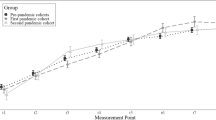
Effects of the COVID-19 pandemic on reading performance of second grade children in Germany

At all costs: educational expansion and persistent inequality in the Philippines
A commonly heard light-bulb joke about PhD programs. For a recent report, see “The Long-Haul Degree”. By Patricia Cohen in the New York Times, April 16, 2010. Accessible online at http://www.nytimes.com/2010/04/18/education/edlife/18phd-t.html?pagewanted=all .
This number normally includes the time to finish a masters’ degree.
Some exceptions exist in the United States, notably Ehrenberg et al. ( 2007 ) and Groen et al. ( 2008 ), which evaluated the impact of the Andrew W. Mellon Foundation’s Graduate Education Initiative (GEI) in the 1990s that provided funding to improve the quality of PhD programs in humanities and related social sciences.
EUI Strategic Review, November 1991, “Beyond Maintenance”. Although this review was published later than the year 1990, the recommendations would affect students starting in the 1989/90 student cohort.
“EUI Strategic Review. November 2001 Enhancing and Enlarging. The Future EUI”. The main results of the review were put in place for the student cohort that had started in the year 2000.
See for instance the position paper issued by the Coimbra group on doctoral education, a leading coalition of research universities. http://www.coimbra-group.eu/uploads/2010-2011/DoctoralProgrammesPositionPaper.pdf .
Our results do not change substantively when we apply the time-restrictions more sharply (i.e. 4 years is 48 months, 5 years is 60 months, and 6 years is 72 months).
Unfortunately we were not able to retrieve the departmental assessment of candidates in the selection procedure. We are therefore not able to include any measures of academic ability in our list of covariates. Nevertheless, since the process is so selective, the variance in academic ability may not be all that big.
Table 4 in the Appendix reports the detailed results of the autocorrelation tests, which were performed using the user-written command –actest– (Baum and Schafer 2013 ) in Stata 14.1 (StataCorp 2015 ).
The models were estimated using the user-written command –itsa– (Linden 2015 , 2017 ) in Stata 14.1 (StataCorp 2015 ).
More precisely, Y t is the predictive margin of the outcome of interest, which correspond to the covariate-adjusted predicted probability of graduating within 4, 5 and 6 years and to dropout from the program. More details are provided below.
One might argue that interpreting test statistics makes little sense as we have total population data of EUI students from 1976 to 2006. However, the students who effectively studied at the EUI might be seen at as a sample from a universe of students who are eligible for the EUI. Elements of chance in the recruitment resulting from arbitrariness in applying and admitting then creates a mechanism of chance sampling from that super-population, that is, if recruitment were repeated hypothetically different student populations may have been created. Thus, one could interpret standard errors as measures for the variability of the hypothetical distribution of coefficients that could have been produced by other potential recruitment outcomes under the assumption that the null hypothesis is true. Nonetheless, we do not over-interpret test statistics in our setting and use them only in a heuristic way.
For checking robustness, we applied a more flexible local linear regression to our data, using optimal bandwidth (Imbens and Kalyanaraman 2012 ) and lower degree polynomials (Gelman and Imbens 2014 ). Results (available from the authors upon request) were substantially very similar to the models presented in the article.
Detailed results from the logistic regression models from which the predictive margins were derived are available from the authors upon request.
Figure 3 shows the (non-adjusted) observed values of the four outcomes under study and the corresponding adjusted predictive margins. Table 6 reports the ITSA performed on the observed, non-adjusted, data.
Indeed, the coefficients for REF1 × TIME reported in Table 3 , which measure the difference in the slopes after and before the first reform, are not statistically significant.
This finding comes from the 2012 Alumni Survey conducted by the EUI on a sample of 945 former PhD students in order to investigate their following occupational placement.
Abadie, A., Diamond, A., & Hainmueller, J. (2010). Synthetic control methods for comparative case studies: Estimating the effect of California’s tobacco control program. Journal of the American Statistical Association, 105 (490), 493–505.
Article Google Scholar
Abadie, A., Diamond, A., & Hainmueller, J. (2015). Comparative politics and the synthetic control method. American Journal of Political Science, 59 (2), 495–510.
Abedi, J., & Benkin, E. (1987). The effects of students’ academic, financial, and demographic variables on time to the doctorate. Research in Higher Education, 27 (1), 3–14.
Baird, L. L. (1990). Disciplines and doctorates: The relationships between program characteristics and the duration of doctoral study. Research in Higher Education, 31 (4), 369–385.
Ballarino, G., & Colombo, S. (2010). Occupational outcomes of PhD graduates in Northern Italy. Italian Journal of Sociology of Education, 2 (2), 149–171.
Google Scholar
Baum, C. F., & Schafer, M. E. (2013). actest: Stata module to perform Cumby-Huizinga general test for autocorrelation in time series. Statistical Software Components s457668, Boston College Department of Economics. http://ideas.repec.org/c/boc/bocode/s457668.html .
Beekhoven, S., De Jong, U., & Van Hout, H. (2002). Explaining academic progress via combining concepts of integration theory and rational choice theory. Research in Higher Education, 43 (5), 577–600.
Bernal, J. L., Cummins, S., & Gasparrini, A. (2017). Interrupted time series regression for the evaluation of public health interventions: A tutorial. International Journal of Epidemiology, 46 (1), 348–355.
Bhaskaran, K., Gasparrini, A., Hajat, S., Smeeth, L., & Armstrong, B. (2013). Time series regression studies in environmental epidemiology. International Journal of Epidemiology, 42 (4), 1187–1195.
Booth, A. L., & Satchell, S. E. (1995). The hazards of doing a PhD: An analysis of completion and withdrawal rates of British PhD students in the 1980s. Journal of the Royal Statistical Society. Series A (Statistics in Society), 158 (2), 297–318.
Bowen, W. G., & Rudenstine, N. L. (1992). In pursuit of the Ph.D . Princeton, NJ: Princeton University Press.
Breen, R., & Goldthorpe, J. H. (1997). Explaining educational differentials: Towards a formal rational action theory. Rationality and society, 9 (3), 275–305.
Byrne, J., Jørgensen, T., & Loukkola, T. (2013). Quality assurance in doctoral education—results of the ARDE project . Brussels: European University Association.
Council of Graduate Schools. (2010). Ph.D. completion and attrition: Policies and practices to promote student success . Washington DC: CGS.
Crosbie, J. (1993). Interrupted time-series analysis with brief single-subject data. Journal of Consulting and Clinical Psychology, 61, 966–974.
Cumby, R. E., & Huizinga, J. (1992). Investigating the correlation of unobserved expectations: Expected returns in equity and foreign exchange markets and other examples. Journal of Monetary Economics, 30 (2), 217–253.
De Valero, Y. F. (2001). Departmental factors affecting time-to-degree and completion rates of doctoral students at one land-grant research institution. Journal of Higher Education, 72 (3), 341–367.
Ehrenberg, R. G., Jakubson, G. H., Groen, J. A., So, E., & Price, J. (2007). Inside the black box of doctoral education: What program characteristics influence doctoral students’ attrition and graduation probabilities? Educational Evaluation and Policy Analysis, 29 (2), 134–150.
Ehrenberg, R. G., & Mavros, P. G. (1995). Do doctoral students’ financial support patterns affect their times-to-degree and completion probabilities? Journal of Human Resources, 30 (3), 581–609.
Frasier, H. (2013). An analysis of institutional characteristics that contribute to extended time to doctoral degree . Unpublished doctoral dissertation, University of Maryland, College Park.
Gelman, A., & Imbens, G. (2014). Why high-order polynomials should not be used in regression discontinuity designs. NBER Working Paper No. 20405. doi: 10.3386/w20405 .
Golde, C. M. (2005). The role of the department and discipline in doctoral student attrition: Lessons from four departments. The Journal of Higher Education, 76 (6), 669–700.
Gottman, J. M. (1981). Time-series analysis. A comprehensive introduction for social scientists . New York: Cambridge University Press.
Graubard, B. I., & Korn, E. L. (1999). Predictive margins with survey data. Biometrics, 55 (2), 652–659.
Greenland, S. (2004). Model-based estimation of relative risks and other epidemiologic measures in studies of common outcomes and in case-control studies. American Journal of Epidemiology, 160 (4), 301–305.
Groen, J. A. (2012). Time to the doctorate and labor demand for new PhD recipients. Cornell Higher Education Research Institute , mimeo.
Groen, J. A., Jakubson, G. H., Ehrenberg, R. G., Condie, S., & Liu, A. Y. (2008). Program design and student outcomes in graduate education. Economics of Education Review, 27 (2), 111–124.
Groenvynck, H., Vandevelde, K., & Van Rossem, R. (2013). The PhD track: Who succeeds, who drops out? Research Evaluation, 22 (4), 199–209.
Hansen, W. L. (1990). Educating and training new economics PhDs: How good a job are we doing? American Economic Review, 80 (2), 437–450.
Heckman, J., & Hotz, V. J. (1989). Choosing among alternative nonexperimental methods for estimating the impact of social programs: The case of manpower training. Journal of the American Statistical Association, 84 (408), 862–874.
Hovdhaugen, E. (2011). Do structured study programmes lead to lower rates of dropout and student transfer from university? Irish Educational Studies, 30 (2), 237–251.
Imbens, G., & Kalyanaraman, K. (2012). Optimal bandwidth choice for the regression discontinuity estimator. The Review of Economic Studies, 79 (3), 933–959.
Linden, A. (2015). Conducting interrupted time-series analysis for single-and multiple-group comparisons. Stata Journal, 15 (2), 480–500.
Linden, A. (2017). A comprehensive set of postestimation measures to enrich interrupted time-series analysis. Stata Journal, 17 (1), 73–88.
Lott, J. L., Gardner, S., & Powers, D. A. (2009). Doctoral student attrition in the STEM fields: An exploratory event history analysis. Journal of College Student Retention: Research, Theory and Practice, 11 (2), 247–266.
Lovitts, B. E. (2001). Leaving the ivory tower: The causes and consequences of departure from doctoral study . Lanham: Rowman & Littlefield.
Lunneborg, C. E., & Lunneborg, P. W. (1973). Doctoral study attrition in psychology. Research in Higher Education, 1 (4), 379–387.
Mangematin, V. (2000). PhD job market: Professional trajectories and incentives during the PhD. Research Policy, 29 (6), 741–756.
McKnight, S., McKean, J. W., & Huitema, B. E. (2000). A double bootstrap method to analyze linear models with autoregressive error terms. Psychological Methods, 5, 87–101.
National Science Foundation. (2013). Doctorate Recipients from U.S. Universities 2012. Special Report NSF 14 - 305 . Arlington, VA. Retrieved September 3, 2017 from http://www.nsf.gov/statistics/sed/digest/2012 .
Price, J. (2006). Does a spouse slow you down? Marriage and graduate student outcomes. Cornell University, School of Industrial and Labor Relations site. Retrieved September 3, 2017 from http://digitalcommons.ilr.cornell.edu/workingpapers/147 .
Rodriguez-Planas, N. (2012). Longer-term impacts of mentoring, educational services, and learning incentives: Evidence from a randomized trial in the United States. American Economic Journal: Applied Economics, 4 (4), 121–139.
Seagram, B. C., Gould, J., & Pyke, S. W. (1998). An investigation of gender and other variables on time to completion of doctoral degrees. Research in Higher Education, 39 (3), 319–335.
Shadish, W.R., Cook, T. D., & Campbell, D. T. (2002). Experimental and quasi - experimental designs for generalized causal inference . Wadsworth Cengage learning.
Siegfried, J. J., & Stock, W. A. (2001). So you want to earn a Ph.D. in economics? How long do you think it will take? Journal of Human Resources, 36 (2), 364–378.
Smallwood, S. (2004). Doctor dropout. The Chronicle of Higher Education, 16th January. Retrieved December, 2015.
StataCorp. (2015). Stata Statistical Software: Release 14 . College Station: StataCorp LP.
Stock, W. A., Finegan, T. A., & Siegfried, J. J. (2006). Attrition in economics Ph.D. programs. The American Economic Review, 36 (2), 458–466.
Taljaard, M., McKenzie, J. E., Ramsay, C. R., & Grimshaw, J. M. (2014). The use of segmented regression in analysing interrupted time series studies: An example in pre-hospital ambulance care. Implementation Science, 9 (1), 77.
Tinto, V. (1993). Leaving college: Rethinking the causes and cures of student attrition (Rev ed.). Chicago: University of Chicago Press.
Van de Schoot, R., Yerkes, M. A., Mouw, J. M., & Sonneveld, H. (2013). What took them so long? Explaining PhD delays among doctoral candidates. PLoS ONE, 8 (7), e68839.
Van der Haert, M., Arias Ortiz, E., Emplit, P., Halloin, V., & Dehon, C. (2014). Are dropout and degree completion in doctoral study significantly dependent on type of financial support and field of research? Studies in Higher Education, 39 (10), 1–25.
Van Ours, J. C., & Ridder, G. (2003). Fast track or failure: A study of the graduation and dropout rates of PhD students in economics. Economics of Education Review, 22 (2), 157–166.
Wagner, A. K., Soumerai, S. B., Zhang, F., & Ross-Degnan, D. (2002). Segmented regression analysis of interrupted time series studies in medication use research. Journal of Clinical Pharmacy and Therapeutics, 27 (4), 299–309.
Wao, H. O., & Onwuegbuzie, A. J. (2011). A mixed research investigation of factors related to time to the doctorate in education. International Journal of Doctoral Studies, 6, 115–134.
Williams, R. (2012). Using the margins command to estimate and interpret adjusted predictions and marginal effects. Stata Journal, 12 (2), 308–331.
Wright, T., & Cochrane, R. (2000). Factors influencing successful submission of PhD theses. Studies in Higher Education, 25 (2), 181–195.
Zhou, E. & Okahana, H. (2016). The role of department supports on doctoral completion and time-to-degree. Journal of College Student Retention: Research, Theory & Practice . doi: 10.1177/1521025116682036
Download references
Acknowledgements
We would like to thank the European University Institute for providing us with the data and Ken Hulley for precious guidance on the information contained in the dataset. We would like to thank the participants to our seminar at the EUI’s Economics Department (2015) and at the COMPIE Conference at the Catholic University of Milan (2016) for useful comments. We would also like to express our gratitude to Hans-Peter Blossfeld, Andrea Ichino, Michael Grätz, Hannes Kröger, Loris Vergolini, and Nadir Zanini, as well as two reviewers who provided stimulating remarks on a previous version of this article. All remaining errors are our own.
Author information
Authors are in alphabetical order. All authors contributed equally to the paper.
Authors and Affiliations
World Bank, G7-700, 1776 G ST NW, Washington, DC, 20006, USA
Department of Sociology, School of Social Sciences and Philosophy, Trinity College Dublin, The University of Dublin, Dublin 2, Ireland
Department of Sociology and Social Research, University of Trento, Via Verdi 26, 38122, Trento, Italy
Moris Triventi
You can also search for this author in PubMed Google Scholar
Corresponding author
Correspondence to Moris Triventi .
See Tables 4 , 5 and 6 and Fig. 3 .
Comparison of observed data and adjusted predictive margins of the outcomes under study. Note Predictive margins represent the expected probability of an outcome for a certain year (entry cohort) adjusted for covariates
Rights and permissions
Reprints and permissions
About this article
Geven, K., Skopek, J. & Triventi, M. How to Increase PhD Completion Rates? An Impact Evaluation of Two Reforms in a Selective Graduate School, 1976–2012. Res High Educ 59 , 529–552 (2018). https://doi.org/10.1007/s11162-017-9481-z
Download citation
Received : 06 October 2016
Published : 11 October 2017
Issue Date : August 2018
DOI : https://doi.org/10.1007/s11162-017-9481-z
Share this article
Anyone you share the following link with will be able to read this content:
Sorry, a shareable link is not currently available for this article.
Provided by the Springer Nature SharedIt content-sharing initiative
- Doctoral program
- Time-to-degree
- Interrupted time-series analysis
- Find a journal
- Publish with us
- Track your research

UCL English

MPhil/PhD in English Literature and Language
One of the highest-ranking English Departments in the UK, UCL provides fantastic opportunities for PhD students to study in the heart of literary London, with access to vast quantities of resources and research materials, and a high number of academic staff working on a diverse range of specialist topics.
Note that you should identify a prospective supervisor yourself (see our list of staff ) and contact them before you make your formal application, to check that they are in a position to support the project that you are proposing.
Dr Julia Jordan ( [email protected] ) is the English Department's Graduate Tutor. Application enquiries can also be directed to Natasha Clark ( [email protected] ), Senior Education Administrator.
With access to a vast collection of archival materials, and world-leading supervision in a wide range of literary periods and topics, UCL is one of the best universities in which to study for an English PhD.
There are normally about 45 students undertaking research degrees in the department. Graduate students initially register for the MPhil degree, but usually in the second year, when a realistic and workable thesis has been confirmed, and work-in-progress and a future plan have been discussed, students are upgraded from MPhil to PhD status.
Students accepted for admission are given a principal supervisor with whom the student will work closely during the course of the degree. A secondary supervisor is also appointed to provide additional advice. Great importance is attached to matching student and supervisor, and ensuring that students' progress is well monitored. Students meet either one or other supervisor approximately ten times during the academic year. The Department is eager to ensure PhD completion rates within four years, and therefore reviews each student's progress by means of an interview at the end of each year. When completed and submitted, the thesis is defended in an oral examination.
Students are expected to complete the PhD within three or four years of registration, and the minimum period of registration is two years. Part-time students complete the degree within five to seven years of registration.
The Department offers MPhil/PhD supervision in a wide range of topics, including English and English-related language and literature from Old English to the present day. Information on the research interests of staff can be found here (click on the name of each member of staff to access their personal profile).
Research Resources
UCL Library has outstanding physical and digital collections for literary research, as well as specialist materials in its excellent Special Collections department. Among these are the George Orwell Archive; Little Magazines; the Routledge and Kegan Paul Archives (publishing history); the Brougham Papers and papers of the Society for the Diffusion of Useful Knowledge (19th-century liberalism); and the Chadwick Papers (19th-century sanitary reform). UCL Library also has superb holdings in London history. For language topics the Department is especially well placed, as it houses the world-renowned Survey of English Usage.
Other London archives with manuscript and rare book resources relevant to the Department’s research interests include (but are by no means limited to):
- British Library
- University of London Library (Senate House Library)
- Guildhall Library
- London Library
- Library of the London School of Economics
- Dr Williams’s Library
- Bishopsgate Institute Library
- Library of the Victoria and Albert Museum
- Archives of the Royal Society
- The Women’s Library at London School of Economics
Research is expected to take students into numerous libraries and archives, not only within London, but also throughout Britain, and often internationally.
Research Environment
The Department places great emphasis on opportunities for students to discuss their work and participate in the exchange of knowledge and ideas. There is a programme of regular departmental Research Seminars at which PhD students are invited to present their work; speakers may also include members of the department’s academic staff and invited guests. The department also hosts a seminar series on Race, Power, and Poetics , and a wide range of informal discussion groups and reading groups.
The Institute of Advanced Studies (part of the Faculty of Arts and Humanities) hosts an exciting programme of research events and activities. UCL students also have access to the abundance of seminars and conferences available across London, including those of the Institute of English Studies at the University of London.
The English Department’s graduate students organise a one-day conference each year; many of the papers delivered at the conference are published in Moveable Type , the Department's graduate-led online journal. There is a Graduate Common Room in the English Department. Many PhD students spend much time working at the British Library, to which UCL has unrivalled proximity, which also functions as a hub for academic networking.
Details of current PhD students and their projects can be found here .
Your research proposal does not need to be long (typically somewhere between 800-1000 words). The most important things we are looking for you to explain are:
1) What primary literature/texts will you be studying?
2) What is your idea/approach to this literature?
3) How does your project fit in to the secondary literature/criticism on this topic?
4) Practical details, like which archives you will use, roughly how long you will spend on each chapter, what each chapter may be about, etc
5) That you have considered how the chosen project will work within a 100,000 word limit (so it's clearly not something so small that it's 20,000 words maximum, nor have you chosen something so big that you couldn't possibly do it justice in 500,000).
Proposals and intentions often change a little/quite a lot once they are on the course, but the important thing is just to demonstrate that you have thought about the practicalities and you have a clear, viable research topic that we could supervise in the Department, and which you could complete within three years.
Applicants should usually expect to begin their studies in September at the start of an academic year (although in some cases, a January start can be discussed). UCL’s application process usually opens in mid-October, and you are encouraged to apply as early as possible, as there are a number of stages to the process.
It is essential to understand that your application for a place must be fully processed, and an offer of a place at UCL secured, before you can apply to any of the various funding schemes (see under ‘Applying for Funding’ below). You should allow time for this, and for us to advise you on your funding application(s). For this reason your full, formal application for a place via UCL’s online system must be submitted by Friday 5 January 2024 at the latest . This is an internal departmental deadline and supersedes any dates given on external websites.
We strongly recommend that all candidates should apply for funding; but those candidates who intend to self-fund may apply for entry in September 2024 at any time up to 31 March 2024.
The steps for applying for a place take some time, and are as follows:
1. Contact a member of staff in the English Department to establish whether they are available and interested in supervising your project. They may ask to see your CV and a brief research proposal (see above, ‘The Research Proposal’). You can find details of the research interests of individual members of staff here (click on each name to see the staff member’s profile). If you are not sure who to approach, you may consult the English Department’s Graduate Tutor, Dr Julia Jordan ( [email protected] ) .
Please be aware that members of staff cannot give detailed advice on how to improve your research proposal. This is because evaluation of the proposal is an important part of the process for the selection of candidates, so it must be your own independent work. If we invite you for interview (step 3 below) this will be an opportunity for you to discuss your proposal with your prospective supervisor. If we offer you a place (step 4 below), we will then advise you on how to make your research proposal as strong as possible for your funding application(s).
2. If you have been encouraged to make a full, formal online application, please do so, following the instructions here . Your application must include a research proposal, two references, a CV, and transcripts from your previous academic courses. If you intend to proceed to funding applications, your application for a place must be submitted by 5 January 2024 . When you submit your application, please also send your research proposal and academic CV directly by email to the English Department’s Graduate Tutor, Dr Julia Jordan ( [email protected] ) .
Applying as an international student
Further information about English language requirements and applying as an international student can be found here: https://www.ucl.ac.uk/prospective-students/graduate/applying-international-student .
3. The English Department will consider the strength of each applicant’s proposed research project, the applicant's grades in undergraduate and Masters level study, and the suitability (and availability) of academic staff in the Department to supervise the proposed project. If we decide to proceed with the application, the applicant will be invited to a short interview to discuss the research proposal in more detail. This will normally be with the applicant's proposed primary supervisor, a potential secondary supervisor, and/or the Tutor for Graduates. UK applicants will normally be interviewed at UCL; international students, or those who are unable to attend for other reasons, will be interviewed online. Please try to ensure that you are available for interview from November to January.
4. If your interview is successful, we will offer you a place. You can now proceed to funding applications (see ‘Applying for Funding’ below). PLEASE NOTE: it is your responsibility to be aware of the deadlines for different funding schemes, and to ensure that there is time for your application for a place to be fully processed before you proceed to funding applications.
Scholarships for which you may be eligible to apply are listed here .
Studentships for PhDs in English at UCL are available from LAHP (the London Arts and Humanities Partnership), funded by the AHRC (Arts and Humanities Research Council). LAHP is a consortium of Higher Education Institutions in London. More information, including eligibility for a studentship and how to apply, is available from their website . Around 10% of applications for studentships are successful.
Applicants who are interested in LAHP funding must also have submitted a completed PhD application to UCL by Friday 5 January 2024. Once we have confirmed your offer of a place, you must then submit a completed LAHP application form, including the supervisor statement, by their deadline ( 26th January 2024 at 5pm ). Your prospective supervisor will advise you on how to make your LAHP application as strong as possible. It is your responsibility to allow sufficient time for all of these processes.
If you have any further questions about the LAHP application procedure, please email Ms Natasha Clark ( [email protected] )
Research Excellence Scholarship (RES)
UCL Research Excellence Scholarships aim to attract high-quality students to undertake research at UCL. Up to 40 UCL Research Excellence Scholarships (RES) are available to prospective and current research students from any country.
More details about the application process for the Research Excellence Scholarships, including deadlines, can be found here .
Wolfson Scholarships
The Wolfson Foundation is offering six postgraduate research awards in the humanities for 2024/25. These will be for three areas in history, literature and languages.
Details about the award scheme and the application process can be found here .
Applicants should send the mandatory documents to Natasha Clark ( [email protected] ) by the end of 12 January 2024.
UCL Research Opportunity Scholarship
UCL's Research Opportunity Scholarship (UCL-ROS) supports UK BAME postgraduate research degree students. Details about eligibility, the award and the application process can be found here .
Each student works closely with their supervisor to develop research skills specific to their project. Regular completion of an online research log helps the student and supervisor to assess training needs.
The English Department provides a course in PhD Skills Training. The first term is on Research Skills and Methods, and is aimed at first-year students, who are required to attend. The second term is on Professional Academic Skills, and is open to all PhD students.
Across UCL, PhD training is co-ordinated by the Doctoral School . The Doctoral Skills Development Programme is delivered via the Inkpath platform, and benefits from participation by the Bloomsbury Postgraduate Skills Network , a consortium of leading Higher Education Institutions.
Training courses and events are also available from LAHP (the London Arts and Humanities Partnership). LAHP-funded students are given priority for booking, but places may also be available to other students.
Teaching opportunities for research students
PhD students who are making good progress with their research project are offered teaching opportunities. Those in their second year are normally offered experience in teaching one-to-one tutorials. Those in their third year are normally offered experience in teaching seminars.
PhD students in English also work with UCL’s Access and Widening Participation team to deliver a highly successful Summer School for Year 12 school students.
Employment Prospects
PhD graduates from the Department have an excellent record of securing employment in institutions of higher education. In recent years PhD alumni have progressed to academic positions here at UCL, as well as at Oxford and Cambridge, in the wider University of London, and at other universities across the UK. Others have successfully gained international appointments, in destinations including the United States, Canada, and New Zealand. Our PhD graduates are also well placed to pursue careers outside academia, as the skills in research, analysis, writing, and communication obtained during the PhD transfer easily to high-level work in many sectors.
UCL prospectus page for the MPhil/PhD programme.
For further information, please email Natasha Clark ( [email protected] ).
Apply Online
You can find a link to the online application form on the main UCL website at the bottom of this page: http://www.ucl.ac.uk/prospective-students/graduate/apply
We do accept some visiting students, if there is a suitable academic to act as supervisor. The first step is to identify someone who looks like a suitable supervisor by looking through the list of academic staff yourself: https://www.ucl.ac.uk/english/people/academic-staff . Then, you should contact them with your research proposal to see if they think they would be well-positioned to supervise and will be available to do so over the period of time you’d like to visit. If they are happy to supervise you, you must submit an application via our online system. Further details about this and the link for applying can be found on this page: https://www.ucl.ac.uk/prospective-students/international/study-abroad-and-exchange/visiting-research-students .

Student Views

"I am currently completing my PhD on Shakespeare. The English department at UCL is a very special place: the academic staff are dedicated, supportive. I would whole-heartedly recommend applying to study English at UCL."
Shani Bans, PhD Candidate


Studentships and doctoral training
Get a studentship to fund your doctorate.
UKRI studentships offer funding for doctoral research. They also offer you access to training, networking and development opportunities to help you build a research and innovation career.
Our expectations for research organisations, supervisors and students are set out in the statement of expectations for doctoral training .
You could get:
- a minimum stipend of £19,237 per year for your living costs, which is paid to you in regular instalments
- support for your tuition fees (minimum £4,786 per year)
The stipend is usually non-taxable and does not need to be paid back. Some research organisations may offer more if you study in London, or they or one of their collaborators might decide to top up the payment. This will be outlined in the studentship advert from the research organisation.
We normally pay the support for tuition fees directly to your research organisation.
The levels given here are for the academic year 2024 to 2025. UKRI’s approach to doctoral stipend and fee levels will be reviewed through the new deal for postgraduate research .
Additional support for your doctoral studies
As a UKRI-funded doctoral student, you may be able to access additional funding to cover the cost of other related training and development opportunities.
This could include:
- conference attendance
- language training
- overseas research visits
- internships or placements with a non-academic partner
The availability of support will depend on the research organisation and the training grants they have on offer. You should contact the research organisation you are interested in applying to, to find out what you could get.
Extra support if you have a disability
If you have a disability, you may be entitled to a Disabled Students’ Allowance (DSA) on top of your studentship.
You should speak to your research organisation’s disability advisor to assess your needs. They can help put the right support in place, including a DSA application if necessary. You cannot claim DSA directly from UKRI.
DSA helps to cover the cost of any additional support that a person studying for a doctorate might need as a result of a disability, mental health problem or specific learning difficulty.
The allowance covers:
- non-medical personal assistance
- specialist equipment
- extra travel costs
- general expenses
Find out more about DSA in our framework .
If you are a research organisation you can download claim forms and guidance for DSA .
Who can apply
Any prospective doctoral student wishing to study at a UK research organisation, including prospective international students, can apply for a UKRI studentship.
All UKRI-funded doctoral students will be eligible for the full award, both the stipend to support living costs, and home-level fees at the UK research organisation rate.
How to find opportunities
Many UK research organisations offer some form of studentship funding from UKRI. These opportunities will depend on the subject you want to study and will normally be advertised by the research organisations.
Research organisations may have additional opportunities that do not involve UKRI. UKRI supports around 20% of all UK-based postgraduate researchers. You should speak to the research organisation you are interested in to find out what studentships are available.
You could also consider using a specialist website like FindaPhD to look for opportunities.
When to apply
Research organisations set their own deadlines for applications.
Many open for applications early in the academic year and close in January or February. This is not a hard and fast rule. It is important that you check the deadlines for the research organisation where you want to study.
How to apply
You cannot apply to UKRI for a studentship. You must contact the research organisation you are interested in studying with and use their application process.
For doctoral students who are already studying with a studentship, there are opportunities to get additional funding to support placements that are separate from your doctorate. Find training and development opportunities .
Last updated: 14 February 2024
This is the website for UKRI: our seven research councils, Research England and Innovate UK. Let us know if you have feedback or would like to help improve our online products and services .

PhD Completion Rates UK
Last Updated on December 29, 2022 by
Those of you seeking the phd viva failure rate and can you fail a phd? need not look further as the article below gives you all the information you require and more. Below are 10 facts about different subfields of physics, followed by extensive lists of famous physicists in each field.
Find information in the article below regarding phd duration in usa & phd in uk duration.
What’s more? You will find related posts on phd in uk fees, cost of phd in usa for international students & phd requirements in uk for international students on collegelearners.
Getting a PhD in UK
The analysis uses a new method to calculate rates of qualification from postgraduate research degree study and replaces the research degree qualification rates (RDQRs) method that has been used by HEFCE since 2007. This updated method means that the data are not directly comparable with those calculated and published by HEFCE previously. It is intended to provide more relevant information and be less burdensome to HEIs and HEFCE than the previous one, which involved verification of data going back several years. The new method is consistent with the one we use to calculate completion rates for undergraduate students, and aims to be more objective, fair and reliable.
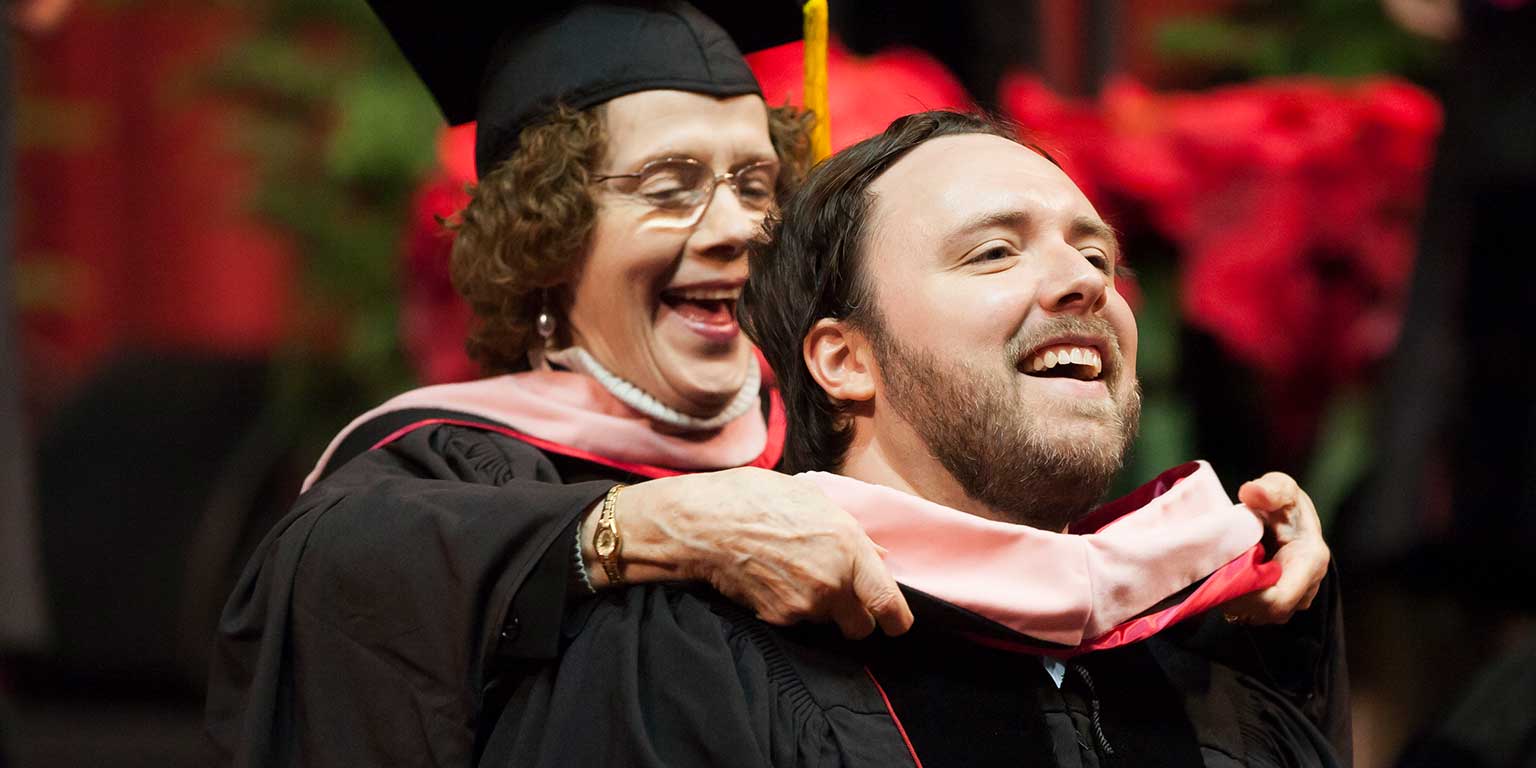
Rates of qualification from research degree study are projected for students living in the UK and EU, who started full-time research degrees at English HEIs in 2008-09 and 2009-10. Qualification rates are provided by HEI, projected over periods of 7 and 25 years. We take 7 years as the first point by which there is a reasonable expectation that the majority of students who will ever complete their qualification will have done so. We take 25 years as the point where any student who will ever complete has done so.
The data show the proportions of full-time research degree starters that are in each of three end states that have been projected at 103 HEIs in England. That is the proportion of the cohort expected to have:
• qualified • transferred to another institution, or • become absent from higher education
Embarking on a PhD is a journey of epic proportions. Initially filled with excitement and enthusiasm, students are compelled by the idea of pushing the frontiers of human knowledge.
In time, this enthusiasm can fade. Devoting three to five years of your life to such a tiny subject niche has the ability to do that, even to the most devoted of individuals. Unfortunately, the long and winding road takes both a physical and psychological toll. Stress management will inescapably take centre stage, and your ability to manage it will be extensively tested.
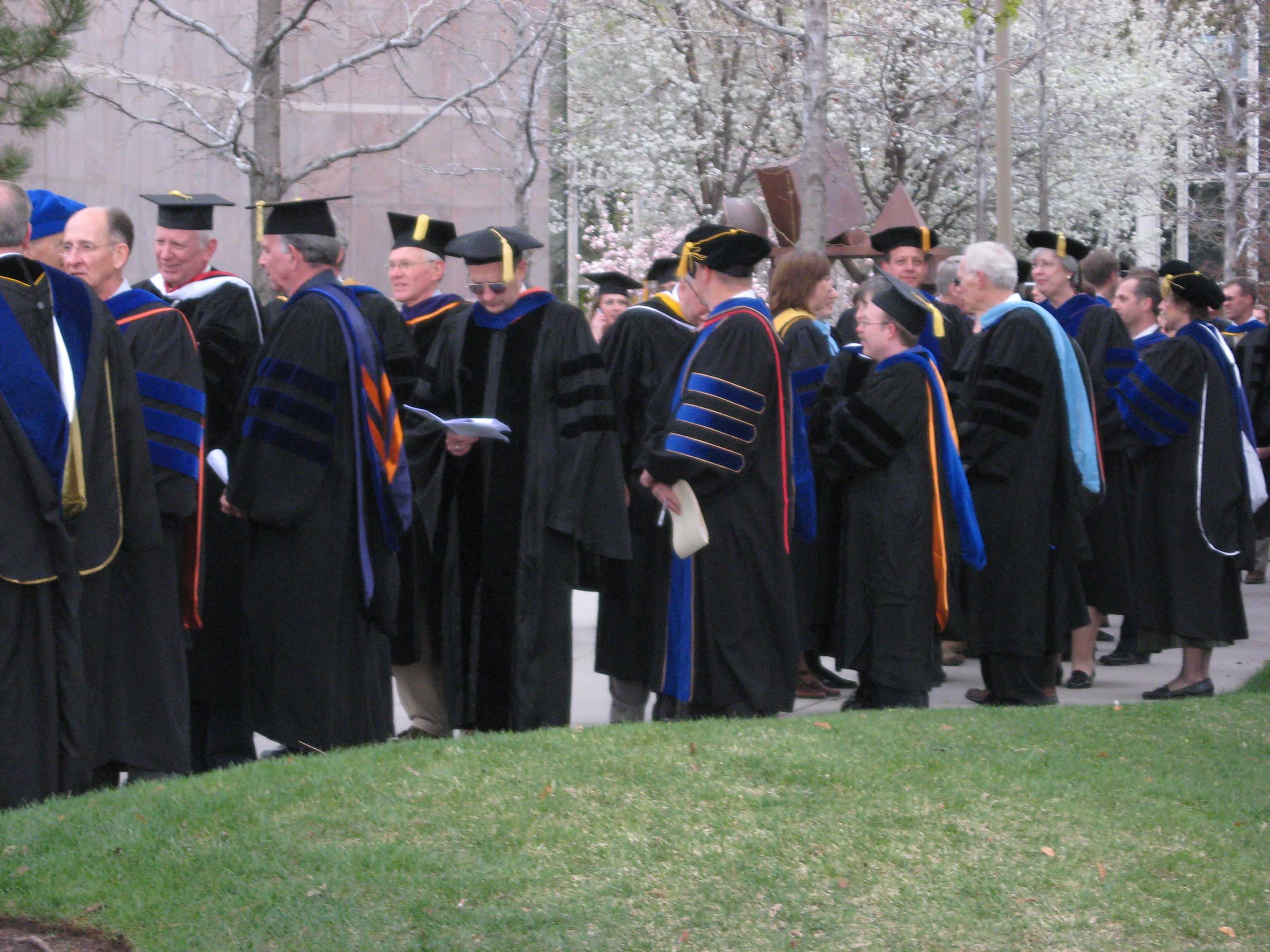
In 2011, a study carried out by the University of Texas found that 43% of their graduate student participants reported experiencing more stress than they were able to handle, with PhD students expressing the highest levels. This likely explains the high attrition rate. In 2013, it was estimated that 30% of students who embark on a PhD in the UK leave university without finishing. This statistic was worse in North America, where in 2008, almost 50% of students left graduate school without their doctorate.
However, research has shown that the majority of students who enter doctoral programs have the academic ability to successfully complete the degree. Therefore, it is likely that the culture of PhD programs are to blame
.PhD Completion Rates UK
The PhD failure rate in the UK is 19.5%, with 16.2% of students leaving their PhD programme early, and 3.3% of students failing their viva. 80.5% of all students who enrol onto a PhD programme successfully complete it and are awarded a doctorate.
Despite what you may have heard, the failing PhD rate amongst students who sit their viva is low.
This, combined with ongoing guidance from your supervisor, is because vivas don’t have a strict pass/fail outcome. You can find a detailed breakdown of all viva outcomes in our viva guide, but to summarise – the most common outcome will be for you to revise your thesis in accordance with the comments from your examiners and resubmit it.
This means that as long as the review of your thesis and your viva examination uncovers no significant issues, you’re almost certain to be awarded a provisional pass on the basis you make the necessary corrections to your thesis.
To give you an indication of the viva failure rate, we’ve analysed the outcomes of 26,076 PhD candidates from 14 UK universities who sat a viva between 2006 and 2017.
The analysis shows that of the 26,076 students who sat their viva, 25,063 succeeded; this is just over 96% of the total students as shown.
can you fail a phd?
There are essentially two ways in which you can fail a PhD; non-completion or failing your viva (also known as your thesis defence ).
Non-completion
Non-completion is when a student leaves their PhD programme before having sat their viva examination. Since vivas take place at the end of the PhD journey, typically between the 3rd and 4th year for most full-time programmes, most failed PhDs fall within the ‘non-completion’ category because of the long duration it covers.
There are many reasons why a student may decide to leave a programme early, though these can usually be grouped into two categories:
- Motives – The individual may no longer believe undertaking a PhD is for them. This might be because it isn’t what they had imagined, or they’ve decided on an alternative path.
- Extenuating circumstances – The student may face unforeseen problems beyond their control, such as poor health, bereavement or family difficulties, preventing them from completing their research.
In both cases, a good supervisor will always try their best to help the student continue with their studies. In the former case, this may mean considering alternative research questions or, in the latter case, encouraging you to seek academic support from the university through one of their student care policies.
Besides the student deciding to end their programme early, the university can also make this decision. On these occasions, the student’s supervisor may not believe they’ve made enough progress for the time they’ve been on the project. If the problem can’t be corrected, the supervisor may ask the university to remove the student from the programme.
Failing The Viva
Assuming you make it to the end of your programme, there are still two ways you can be unsuccessful.
The first is an unsatisfactory thesis. For whatever reason, your thesis may be deemed not good enough, lacking originality, reliable data, conclusive findings, or be of poor overall quality. In such cases, your examiners may request an extensive rework of your thesis before agreeing to perform your viva examination. Although this will rarely be the case, it is possible that you may exceed the permissible length of programme registration and if you don’t have valid grounds for an extension, you may not have enough time to be able to sit your viva.
The more common scenario, while still being uncommon itself, is that you sit and fail your viva examination. The examiners may decide that your research project is severely flawed, to the point where it can’t possibly be remedied even with major revisions. This could happen for reasons such as basing your study on an incorrect fundamental assumption; this should not happen however if there is a proper supervisory support system in place.
The PhD failure rate in the UK is 19.5%, with 16.2% of students leaving their PhD programme early, and 3.3% of students failing their viva. 80.5% of all students who enrol onto a PhD programme successfully complete it and are awarded a doctorate.
According to 2010-11 data published by the Higher Education Funding Council for England (now replaced by UK Research and Innovation ), 72.9% of students enrolled in a PhD programme in the UK or EU complete their degree within seven years. Following this, 80.5% of PhD students complete their degree within 25 years.
This means that four out of every five students who register onto a PhD programme successfully complete their doctorate.
While a failure rate of one in five students may seem a little high, most of these are those who exit their programme early as opposed to those who fail at the viva stage.

phd viva failure rate
What does research say about completion rates.
Research has identified several factors that make students more likely to persist with their degrees. These factors are related to the students themselves, their supervisor, and the university environment.
Psychological studies of postgraduate students find the more successful ones tend to perceive themselves as competent and be intrinsically motivated. These are students who enjoy their topic area, perceive their postgraduate studies as a valuable learning experience, and who strongly identify with being a career researcher. Students who are motivated by external factors (such as pursuing a prestigious academic role) are more likely to say they want to quit.
Scholarship holders are more likely to complete their degrees. This is likely because they are academically stronger than non-scholarship holders and are less vulnerable to financial strain. Students can support themselves financially through teaching, research assistant roles or other work, but this must be balanced carefully. Part-time students are less likely to complete their degrees.
Students’ field of study also affects completion rates. A higher proportion of students in sciences tend to complete their degrees than those in arts and humanities. This is likely because students working in the sciences are more often involved in laboratory-based work in teams, where there is greater social support and knowledge exchange. People studying humanities more often work on their research alone.
A positive student-supervisor working relationship is critical. A good supervisor should be an expert in the student’s subject of choice and a supportive mentor. They should help the student navigate through the frustrations and uncertainties of writing a thesis, and help students adjust to the world of academia.
Students are also more likely to finish their research degrees if they have strong connections with their peers. Such connections help students develop their professional identity as researchers, as well as providing opportunities for social support and informal learning.
The quality of associated coursework is also important. Ideally, postgraduate programs should provide students with a sound foundation of research skills and content knowledge, and facilitate ongoing communication with their faculty.
Involvement in formal and informal professional activities is also important. Students who complete tend to participate in departmental events, such as research seminars and professional development workshops. They also tend to participate in academic conferences. These events allow students to learn and expand their networks.
What students and their supervisors should do
First, given the importance of the student-supervisor relationship, universities can provide advice to students about locating and approaching a suitable supervisor. Specifically, students should consider the research area they wish to work in and locate a supervisor with relevant expertise. They should approach supervisors with an openness to negotiating a research topic.
Both students and supervisors should be upfront about their expectations about how the supervision will work. An excellent starting point for discussion is the Expectations in Supervisionquestionnaire. Students and supervisors sometimes have mismatched expectations about how often they should meet, the amount of feedback the supervisor should provide on drafts, and how much counselling and emotional support the supervisor should provide.
Supervisors have an important role in providing a realistic preview of academic life. One useful exercise is to review an academic competency model, such as the Vitae Researcher Development Framework, to discuss which skills academics need. In addition to knowledge of their topic area and research methods, academics increasingly need to be good at managing complex projects, working in multidisciplinary teams, and engaging with industry and media.
This discussion should enable supervisors and students to plan how students will develop their capabilities. Alternatively, it could prompt some students to opt out of a research degree if they think an academic role is not compatible with their goals.
What universities should do
As well as providing research training, universities can also increase the capabilities of students by helping them understand self-handicapping patterns. These include busyness, procrastination and disorganisation.
Students can be guided to replace these with more helpful actions such as scheduling dedicated writing time, reframing difficult tasks as learning opportunities, and developing a work routine. This could be done as part of a workshop or supervisory relationship.
Universities should also encourage greater connectedness between research students to build social support. This could be accomplished through team-based activities or face-to-face events.
For instance, some universities offer Three Minute Thesis, a research communication competition where students present their work in under 180 seconds.
Some universities organise Shut Up and Write sessions, which turns writing into a social experience and limits distractions. These activities can be complemented by encouraging students to become involved in supportive online communities and blogging.
Finally, universities should be dedicated to helping academics develop as supervisors through ongoing training and coaching. Departments could consider tracking the progression of studentsand ensuring supervisors have the time and skills to take on new students.
Completing a dissertation can be richly rewarding, but it’s the endpoint of a process that’s often long, frustrating and uncertain. Helping students achieve their research aspirations makes academic life a better experience for all involved.
Similar Posts

How Long Does it Take to Become a Detective
Last Updated on December 21, 2022 by Omoyeni Adeniyi To advance in any career you need to have more education, experience, and qualifications than what people at the same level have. To do this, it takes a lot of time and hard work. A detective is usually a police officer who has been promoted to…

Gordon State College Athletics
Last Updated on July 31, 2023 by Oluwajuwon Alvina FOOTBALL CLUB FOOTBALL What is Club Football? Club football is your standard 11-man tackle football played at the collegiate level. Club football offers the opportunity to continue playing the sport if an athlete did not receive a scholarship or would like another year of training before…
university of iowa engineering computer requirements
Last Updated on July 31, 2023 by Oluwajuwon Alvina Although understanding university of iowa engineering computer requirements or getting your head around it isn’t always simple, particularly when you don’t have any prior knowledge of it, finding the right information of it is not as straightforward as you might think. In the article below, you…

Transferring Colleges without Transcripts
Last Updated on August 12, 2023 by Oluwajuwon Alvina Looking for colleges that don’t require previous college transcripts? Our site gives you detailed information on how to transfer to another college without transcript. You can search these schools and see where you want to go. Use collegelearners.com and see what we have to offer. Have…
tokyo institute of technology gpa requirements
Last Updated on December 17, 2022 by Are you an international student? Are you interested in learning more about Tokyo Institute Of Technology? Do you get overwhelmed by the amount of conflicting information you see online? If so, you need not search further because you will find the answer to that question in the article…
UW Engineering Direct Admission Acceptance Rate
Last Updated on December 19, 2022 by Will you like to have access to or know about uw direct admission engineering, uw engineering admissions or uw majors and uw ee acceptance rate? Get ready! Here at collegelearners.com you can find out more about uw engineering admission statistics or uw engineering direct admission statistics . Check…
Leave a Reply
Your email address will not be published. Required fields are marked *
UK's Rightmove cuts 2024 ad revenue forecast on tough market conditions
- Medium Text

- Cuts annual ARPA outlook
- Shares down 5%
- Raises annual customer outlook
Sign up here.
Reporting by Prerna Bedi, Aby Jose Koilparambil and Yamini Kalia in Bengaluru; Editing by Rashmi Aich and Varun H K and Elaine Hardcastle
Our Standards: The Thomson Reuters Trust Principles. New Tab , opens new tab

World Chevron
Palestinian Islamist group Hamas said on Saturday that another one of the hostages abducted during its Oct. 7 attack on Israel has died.
An evacuation alert has been issued for Fort McMurray, Alberta, as an out-of-control fire rages southwest of the major Canadian oil town, making it among the first actions ahead of the wildfire season.

UK's Rightmove top loser on FTSE 100 on retaining forecast
** The real estate portal says higher mortagage rates continue to stretch affordability for buyers
** Flags completion times remaining lengthy with average of five months between an offer being accepted and completion
** Co reiterates its FY24 revenue and margin guidance but raises customer numbers forecast to a 2% growth from 2023, compared to its earlier forecast of a slight decrease
** Sees 2024 ARPA growth to 75 pounds-85 pounds ($93.9-$106.49) on 2023's 1,431 pounds reflecting the change in customer mix
** Co still forecasts a better year for the UK property market vs 2023
** RMV down 3.6% YTD, as of last close
($1 = 0.7982 pounds)

IMAGES
VIDEO
COMMENTS
To summarise, based on the analysis of 26,076 PhD candidates at 14 universities between 2006 and 2017, the PhD pass rate in the UK is 80.5%. Of the 19.5% of students who fail, 3.3% is attributed to students failing their viva and the remaining 16.2% is attributed to students leaving their programme early. The above statistics indicate that ...
Data presented in Section 3 shows the PGR student completion rate for supervised doctoral students for the selected year (01 August to 31 July). The data suggest that our institutional completion rates are low, 65% (AY 13/14), 60% (AY 14/15) and 59% (AY 15/16). Differences in completion rates have also been investigated and are presented below.
Applicants, acceptances and UK 18-year-old entry rates, 2011 to 2020. For the 2020 cycle, the total number of people applying for UK full-time undergraduate higher education courses increased by 3.2% on 2019, while total acceptances increased by 5.4%. The UK 18-year-old entry rate was also at record levels, with 37.0% of this group starting a ...
PhD completion rates, 2013. The proportion of PhD students in England expected to obtain degrees has risen slightly, but at some institutions around a fifth may never qualify. ... 72.9 per cent of the 11,625 students from the UK or the EU who began full-time doctorates in 2010-11 will obtain a degree within seven years.
The completion rate is also high in the UK, where institutions have limited registration periods (unlike in the US where there is no limit on registration time for a PhD). Around 75% of full-time doctorates are submitted within seven years in the UK, which is rising, and about 80% of those funded by the UK Research Councils submit within four ...
The next survey will be available for completion by all STFC PhD students in February 2024. You can read the analysis of responses to the questionnaires from 2019 to 2023. You can read about older results from surveys dating back to 2002 on our page in the UK Government Web Archive. Career path tracking
You may be able to get a PhD loan of up to £27,892 for a UK doctorate. Our guide explains eligibility, applications and repayments. Our guide explains the best ways to fund international PhD study in the UK, with information on all the main scholarships available to you.
Our paper adds to a growing literature of doctoral training by studying factors that drive time-to-completion based on a new and unique data set from an international European graduate school. While previous research focused on individual factors, we inspect the role of institutional factors and the organization of PhD programs for PhD completion.
Within the UK, expectations about the duration of doctoral degrees and completion rates have become codified in multiple policy documents (for some examples, see: (QAA Citation 2018; UKRI Citation 2020)).They are also monitored by some funding bodies (AHRC Citation 2020) and remain a metric of choice for measuring institutional performance of doctoral degrees (UKCGE Citation 2021).
In most faculties, a candidate is expected to have completed one year of postgraduate study, normally on a research preparation master's course, prior to starting a PhD. Completion normally requires three or four years of full-time study, or at least five years of part-time study, including a probationary period.
Published: July 12, 2018 4:01pm EDT. Many students enrol in a Master or PhD postgraduate research degree, but few complete them. From 2010-2016, 437,030 domestic and international students ...
Doctoral attrition is high in many countries, with reported rates of up to 40 to 50% of postgraduate researchers (PGRs) terminating their PhD studies before completion (Geven et al., 2017; Litalien & Guay, 2015).Attrition can be considered a process, in which PGRs weigh the costs and benefits of persisting or discontinuing, and then do or do not actually end their studies accordingly (Jaksztat ...
The data combines projected completion rates with graduate outcomes data to create projected rates of progression from entry to professional employment or further study, and is published at named provider level for the first time. ... Number of UK-domiciled undergraduate students to English higher education providers 2006-07 to 2019-20.
Course. UK tuition fee per year. International tuition fee per year. PhD full-time. £4,786. £17,150, or £18,300 for Animal, Rural and Environmental Sciences, or Science and Technology courses. PhD part-time. £2,393. £8,575, or £9,150 for Animal, Rural and Environmental Sciences, or Science and Technology courses.
Study reveals low PhD completion rates. Donald MacLeod. Mon 10 Jan 2005 19.09 EST. Nearly three out of 10 full-time PhD students have still not completed their doctorates seven years after ...
This report presents an experimental measure to bring together projected data for full-time first degree students who complete their studies (completion rates) and the progression of recent graduates to employment, further study and other activities (graduate outcomes). We published a first iteration of this measure in December 2020. Our update ...
This edition of the UK Performance Indicators will be the last release in this current form. A review of existing indicators will determine which measures will be migrated into core official statistics and open data published in 2023. ... The other method for producing non-completion rates projects what proportion of the full-time first degree ...
Graduate and doctoral schools around the world struggle to shorten the long time to degree and to prevent high dropout rates. While most of previous research studied individual determinants of PhD completion, we analyze the impact of two structural reforms of the doctoral program on thesis completion at a selective European graduate school. Exploiting a unique PhD dataset covering 30 entry ...
The impact of this under-reporting is believed to explain some of the 3% decrease in the number of qualifications achieved in 2019/20 compared with 2018/19, and the impact is most noticeable on the number of part-time qualifications awarded. Qualifications that were not reported in the 2019/20 academic year have carried over to 2020/21 and ...
The Department is eager to ensure PhD completion rates within four years, and therefore reviews each student's progress by means of an interview at the end of each year. ... UK applicants will normally be interviewed at UCL; international students, or those who are unable to attend for other reasons, will be interviewed online. Please try to ...
You could get: a minimum stipend of £19,237 per year for your living costs, which is paid to you in regular instalments. support for your tuition fees (minimum £4,786 per year) The stipend is usually non-taxable and does not need to be paid back. Some research organisations may offer more if you study in London, or they or one of their ...
The non-continuation rate for mature entrants also reduced from 13.5% to 11.9% of full-time first degree entrants not continuing into their second year. Non-continuation indicators were produced for 179 UK HE providers, with rates ranging from 0% to over 30%.
PhD Completion Rates UK. The PhD failure rate in the UK is 19.5%, with 16.2% of students leaving their PhD programme early, and 3.3% of students failing their viva. 80.5% of all students who enrol onto a PhD programme successfully complete it and are awarded a doctorate. According to 2010-11 data published by the Higher Education Funding ...
, opens new tab said on Friday that higher mortgage rates and lengthier completion times for property sales are expected to weigh on buyer sentiment but still forecasted a better 2024 for the UK ...
May 9, 202423:41 PDT. RMV. British real-estate portal Rightmove Plc RMV said on Friday that higher mortgage rates and lengthier completion times for property sales are expected to weigh on buyer sentiment but still forecasted a better 2024 for the UK residential market. Rightmove, kept its annual revenue and profit expectations unchanged but ...
May 10, 202400:40 PDT. RMV UK100. ** Shares of Rightmove Plc RMV down almost 5% at 544.4p. ** Stock top loser on FTSE 100 UK100 index. ** The real estate portal says higher mortagage rates continue to stretch affordability for buyers. ** Flags completion times remaining lengthy with average of five months between an offer being accepted and ...